Shows

Librairie MajalisSerigne A Aziz Mbacké Majalis propose une solution aux inondations de ToubaSerigne A Aziz Mbacké Majalis propose une solution aux inondations de Touba
2025-10-1840 min
Ishq-e-Karimi Podcasts: The Light of IsmailismDasond & Majalis: Love or Obligation?In the name of Allah, the Most Compassionate, the Most MercifulI often ask myself: why is there dasond? why is there naandi? why is money collected in majalis?With respect to my teacher — who is like a gate — and to the Imam, who is Light, through them I seek the spiritual strength of the Imam of the Time, so that this reflection may remain filled with light.I know there are many waez and historical answers to these questions… but today, instead of going into history, I want to pause… and reflect on somet...
2025-09-2806 min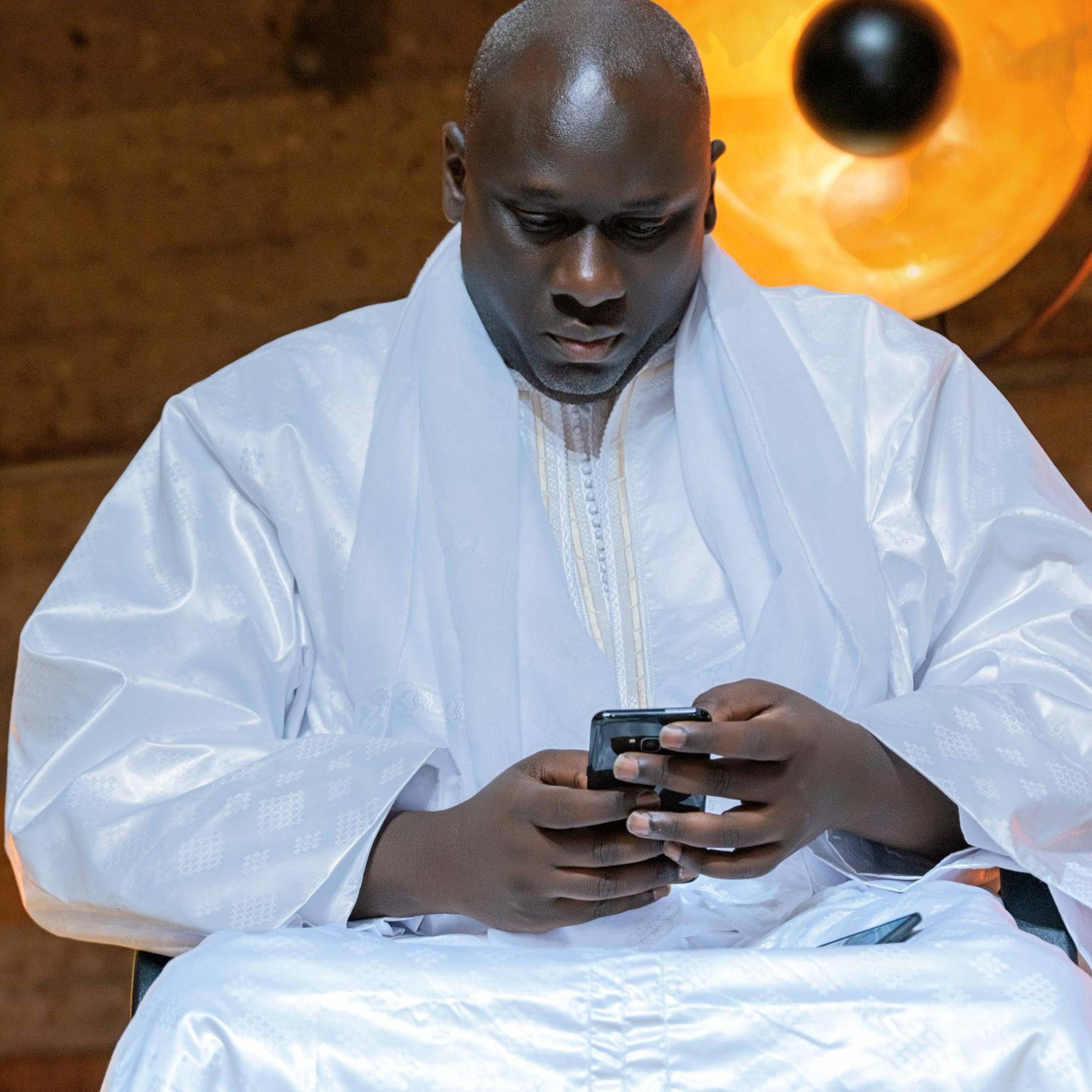
Librairie MajalisUNESCO 2025 : Mots de clôture de S. A. Aziz Mbacké MajalisUNESCO 2025 : Mots de clôture de S. A. Aziz Mbacké Majalis
2025-07-2314 min
Librairie MajalisUNESCO 2025 : S. A. Aziz Mbacké Majalis : « La Plateforme KAGGU et le Projet MouridIA »UNESCO 2025 : S. A. Aziz Mbacké Majalis : « La Plateforme KAGGU et le Projet MouridIA »
2025-07-2326 min
Librairie MajalisWaxtaanu koor 2025 : "jeexiiti Jumtukaayi jokkoo (réseaux sociaux) yu xarala yi ci nekkinu askanu Senegaal: jafe-jafe yi ci aju aki safaanam" (Sëriñ Abdu Aziz Mbàkke Majalis)Waxtaanu koor 2025 : "jeexiiti Jumtukaayi jokkoo (réseaux sociaux) yu xarala yi ci nekkinu askanu Senegaal: jafe-jafe yi ci aju aki safaanam" (Sëriñ Abdu Aziz Mbàkke Majalis) - Jumaay Tuubaa
2025-03-161h 14
Enlightening Pathways and Reflections33. Al-Qadi al-Numan's Majalis: Faith, Love, and Obedience to the ImamsAl-Qadi al-Numan ibn Muhammad (d. 974 CE) was a pivotal figure in the Fatimid Caliphate—a chief jurist, historian, and theologian. As the architect of Fatimid-Ismaili jurisprudence, he authored Daʿāʾim al-Islām and numerous other influential works. He served under four Ismaili Imams:Al-Mahdi Billah (r. 909–934 CE) – Founder of the Fatimid Caliphate; Al-Numan entered Fatimid service under his reign.Al-Qāʾim bi-Amrillāh (r. 934–946 CE) – Fatimid Imam; Al-Numan continued his service.Al-Manṣūr Billah (r. 946–953 CE) – Fatimid Imam; Al-Numan remained a key figure.Al-Muʿizz li-Dīnillāh (r. 953–975 CE) – Fatimid Imam; Al-Numan played a crucial...
2025-02-1622 min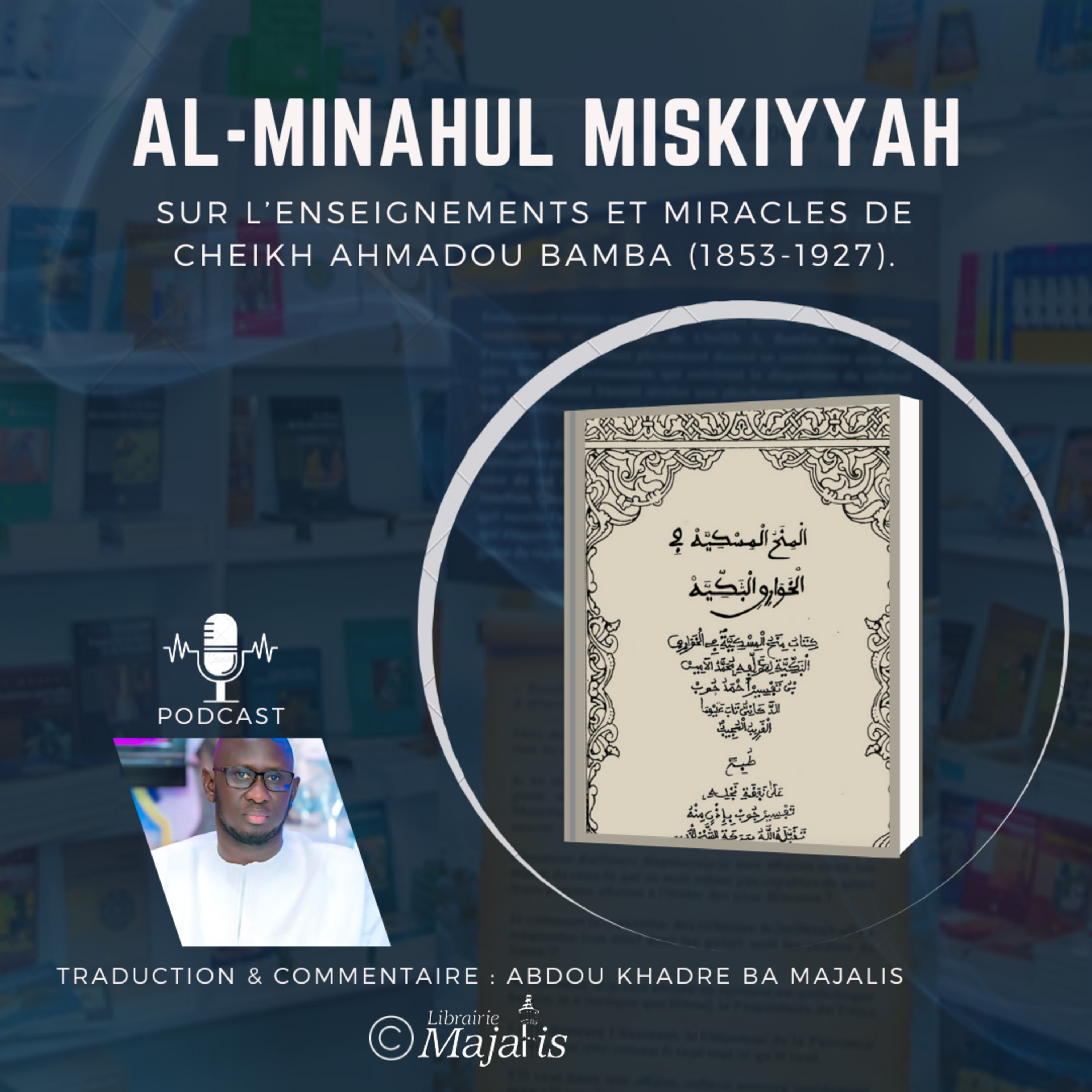
Librairie MajalisMinahu-l Miskiyyah المنح المسكية في الخوارق المبكيةAl-Minahu-l Miskiyyah
المنح المسكية في الخوارق المبكية
Di téere boo xamne Sëriñ Muhammadu-l Amiin Joob Dagana, moo ko bind, jagleel ko lenn ci kéemaane Sëriñ Tuubaa yi mu fekkee, ak yi mu jëlee ci nettali yu wér.
Une oeuvre de Cheikh Mouhamadoul Amine Diop, sur l’enseignements et miracles de Cheikh Ahmadou Bamba (1853-1927)
Traduction & Commentaire : Abdou Khadre BA Majalis
2024-08-021h 57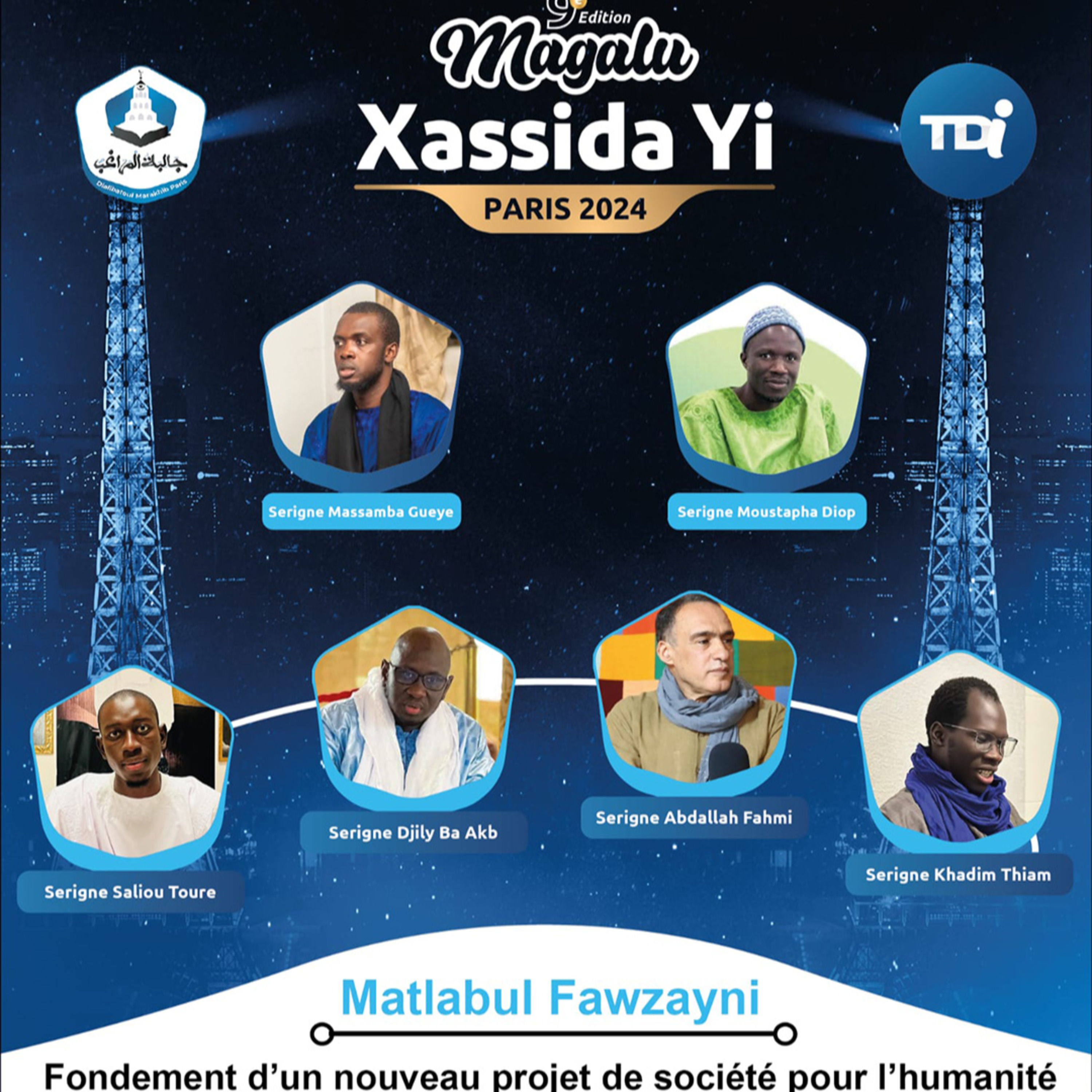
Librairie MajalisWaxtaani Màggalu Qasida yi - "Quelle est l’importance de la citoyenneté selon Fawzeyni ?" par Abdou Khadre Ba MajalisWaxtaani Màggalu Qasida yi - "Quelle est l’importance de la citoyenneté selon Fawzeyni ?" par Abdou Khadre Ba Majalis
2024-05-0221 min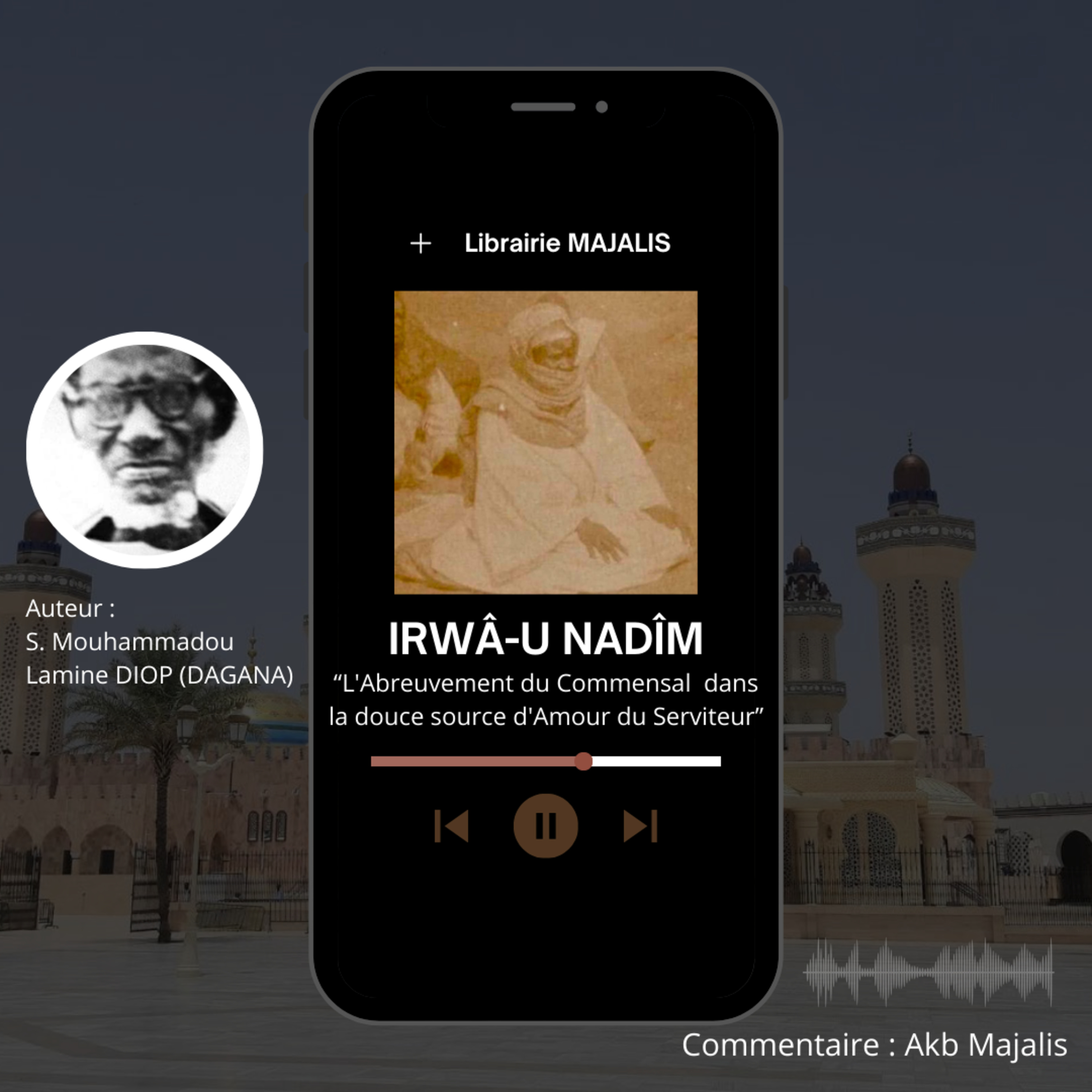
Librairie MajalisIRWÂ-U NADÎM (Livre audio Complet)Cette biographie du Cheikh Ahmadou BAMBA (1853-1927), dont le manuscrit arabe est rédigé en 1963 dans un arabe très classique mais clair, comprend 285 pages (Version Rabita AL-KHADÎMIYYAH) et est divisée en 10 chapitres. Son auteur lui a donné le titre de IRWÂ-U- NADÎM MIN' AZHBI HUBB AL- KHADÎM (L'Abreuvement du Commensal dans la Douce Source d’amour du Serviteur) titre assez révélateur du caractère un peu laudatif de son ouvrage qu'il a écrit dans le but de faire connaître le Saint de ce XIVème siècle de l'Hégire (XXème siècle) et de...
2024-02-147h 07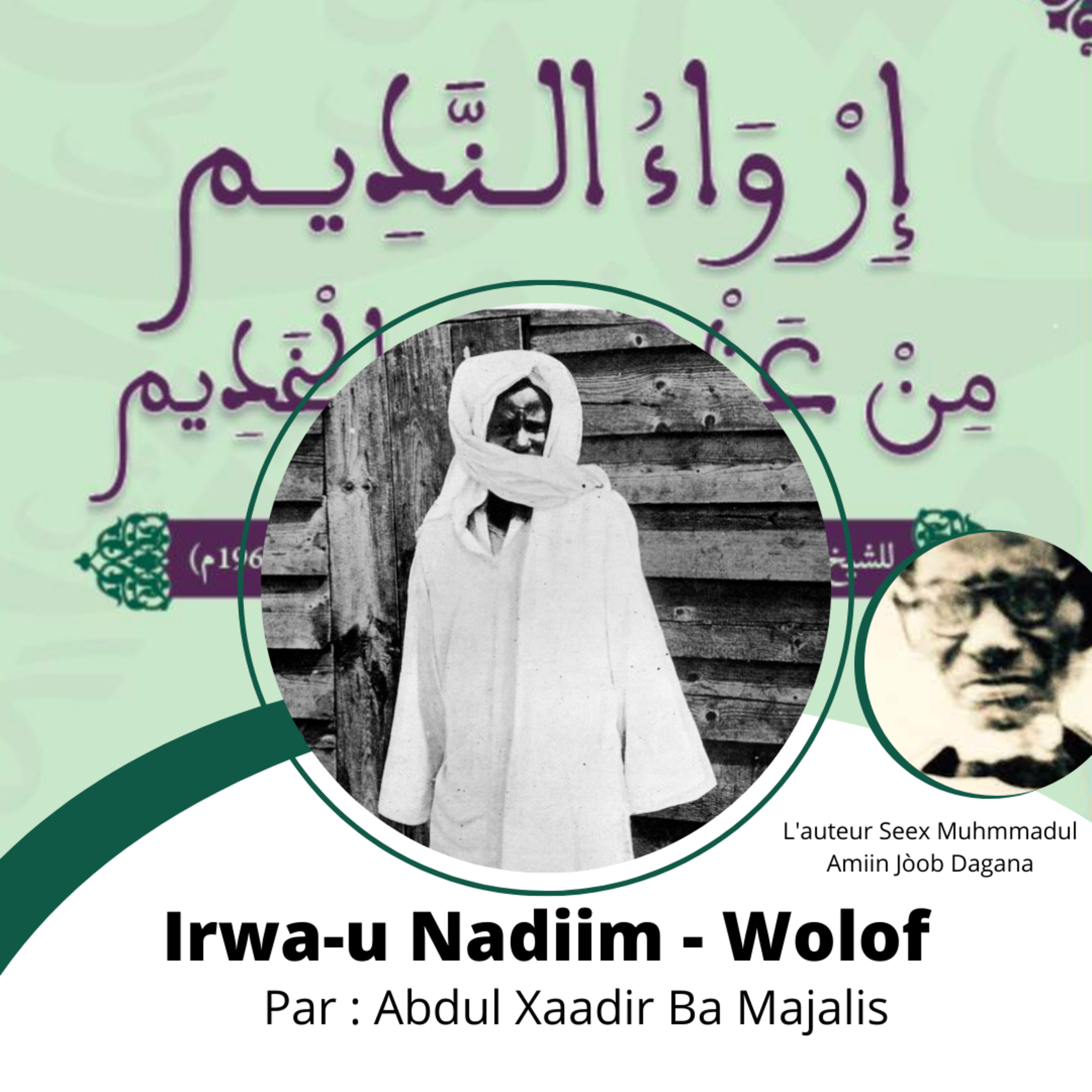
Librairie Majalis#Irwa_u_Nadîm : Leçon 17 - Seede yi mag ñi defoon ci Sëriñ Tuubaa (des témoignages sur le Cheikh) P2 (Dernière leçon)Cette biographie du Cheikh Ahmadou BAMBA (1853-1927), dont le manuscrit arabe est rédigé en 1963 dans un arabe très classique mais clair, comprend 285 pages (Version Rabita AL-KHADÎMIYYAH) et est divisée en 10 chapitres. Son auteur lui a donné le titre de IRWÂ-U- NADÎM MIN' AZHBI HUBB AL- KHADÎM (L'Abreuvement du Commensal dans la Douce Source d’amour du Serviteur) titre assez révélateur du caractère un peu laudatif de son ouvrage qu'il a écrit dans le but de faire connaître le Saint de ce XIVème siècle de l'Hégire (XXème siècle) et de...
2024-02-1328 min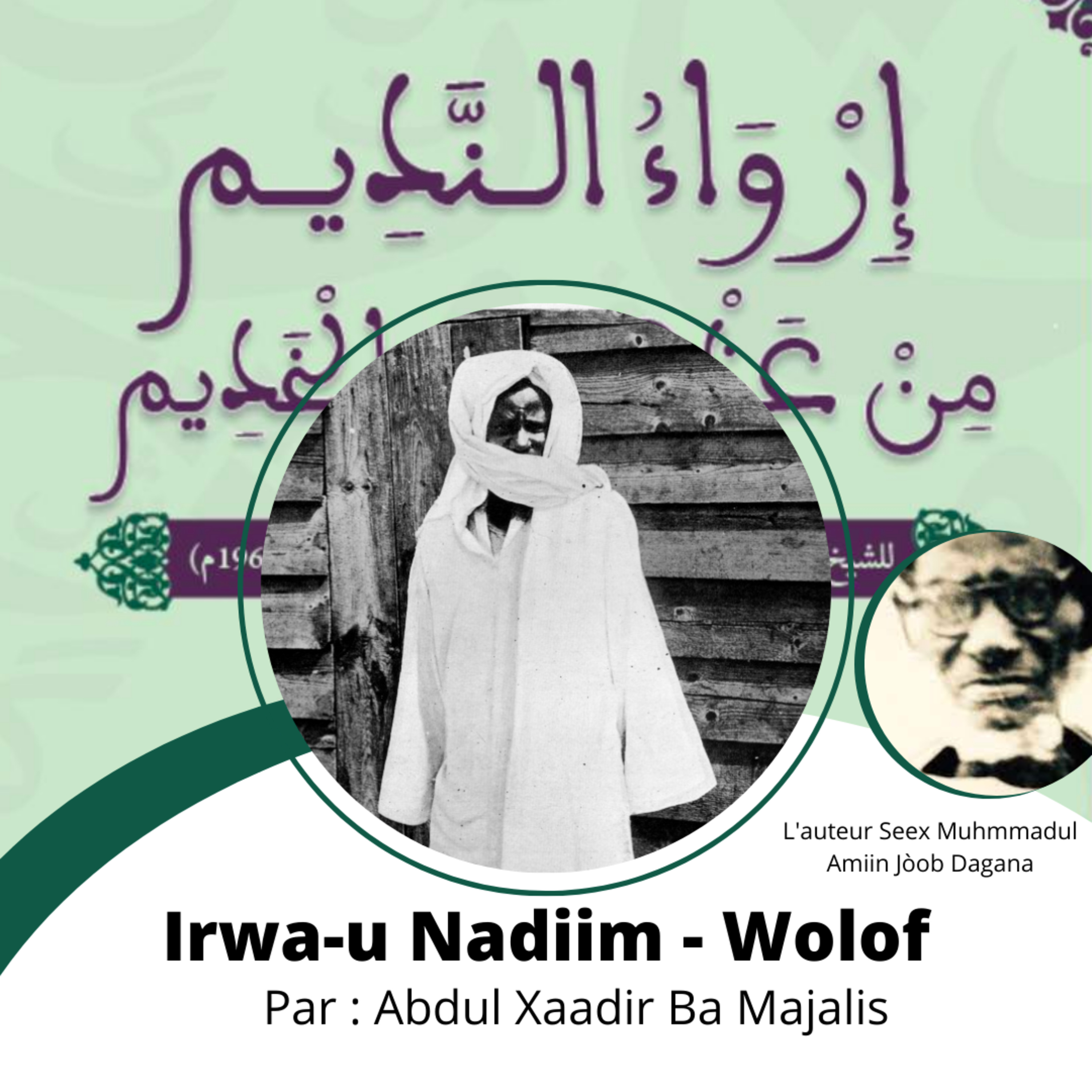
Librairie Majalis#Irwa_u_Nadîm : Leçon 16 - Seede yi mag ñi defoon ci Sëriñ Tuubaa (des témoignages sur le Cheikh) P1Cette biographie du Cheikh Ahmadou BAMBA (1853-1927), dont le manuscrit arabe est rédigé en 1963 dans un arabe très classique mais clair, comprend 285 pages (Version Rabita AL-KHADÎMIYYAH) et est divisée en 10 chapitres. Son auteur lui a donné le titre de IRWÂ-U- NADÎM MIN' AZHBI HUBB AL- KHADÎM (L'Abreuvement du Commensal dans la Douce Source d’amour du Serviteur) titre assez révélateur du caractère un peu laudatif de son ouvrage qu'il a écrit dans le but de faire connaître le Saint de ce XIVème siècle de l'Hégire (XXème siècle) et de...
2024-02-1325 min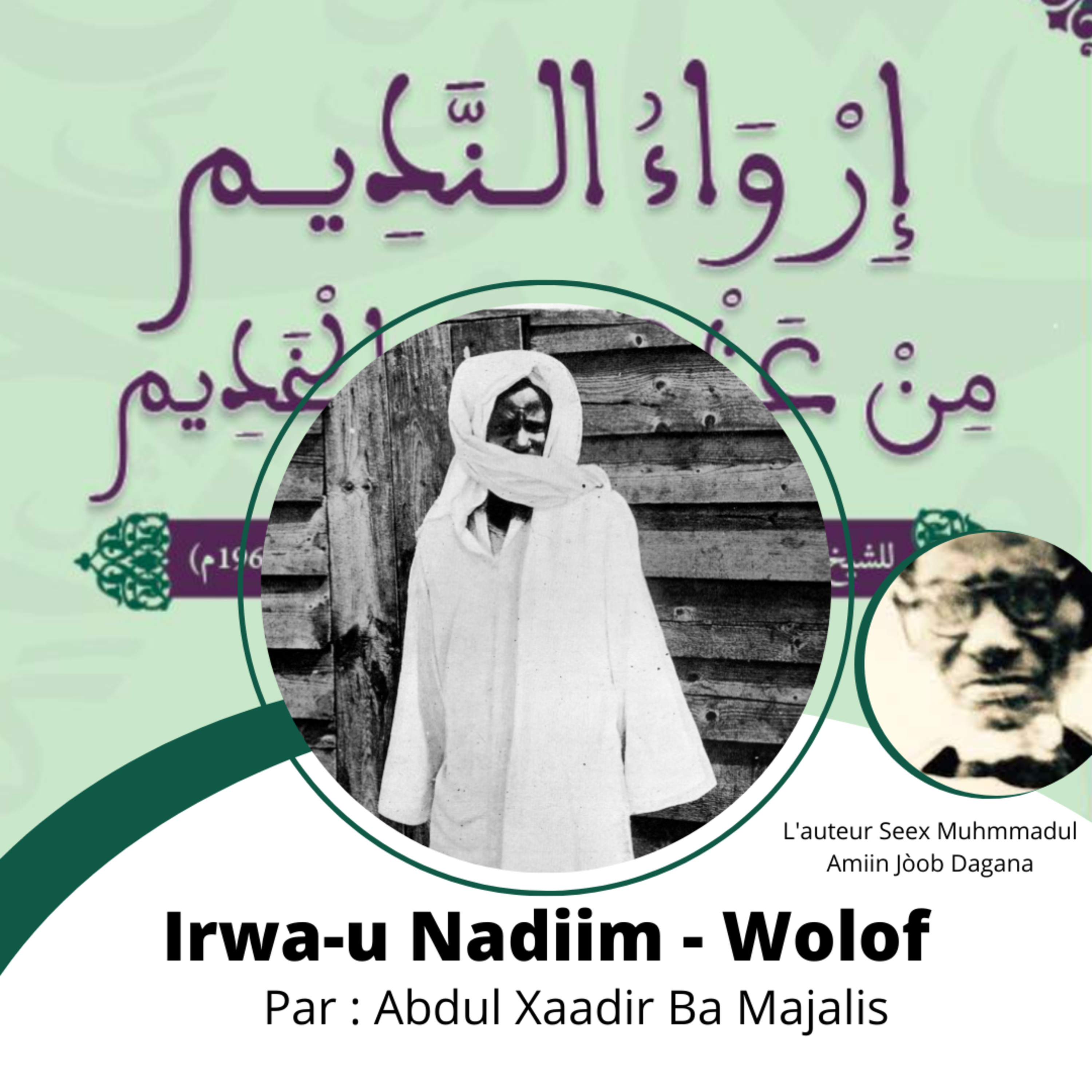
Librairie MajalisIrwaa-u Nadîm : Leçon 15 - Xaatima (Conclusion)Cette biographie du Cheikh Ahmadou BAMBA (1853-1927), dont le manuscrit arabe est rédigé en 1963 dans un arabe très classique mais clair, comprend 285 pages (Version Rabita AL-KHADÎMIYYAH) et est divisée en 10 chapitres. Son auteur lui a donné le titre de IRWÂ-U- NADÎM MIN' AZHBI HUBB AL- KHADÎM (L'Abreuvement du Commensal dans la Douce Source d’amour du Serviteur) titre assez révélateur du caractère un peu laudatif de son ouvrage qu'il a écrit dans le but de faire connaître le Saint de ce XIVème siècle de l'Hégire (XXème siècle) et de...
2024-02-1317 min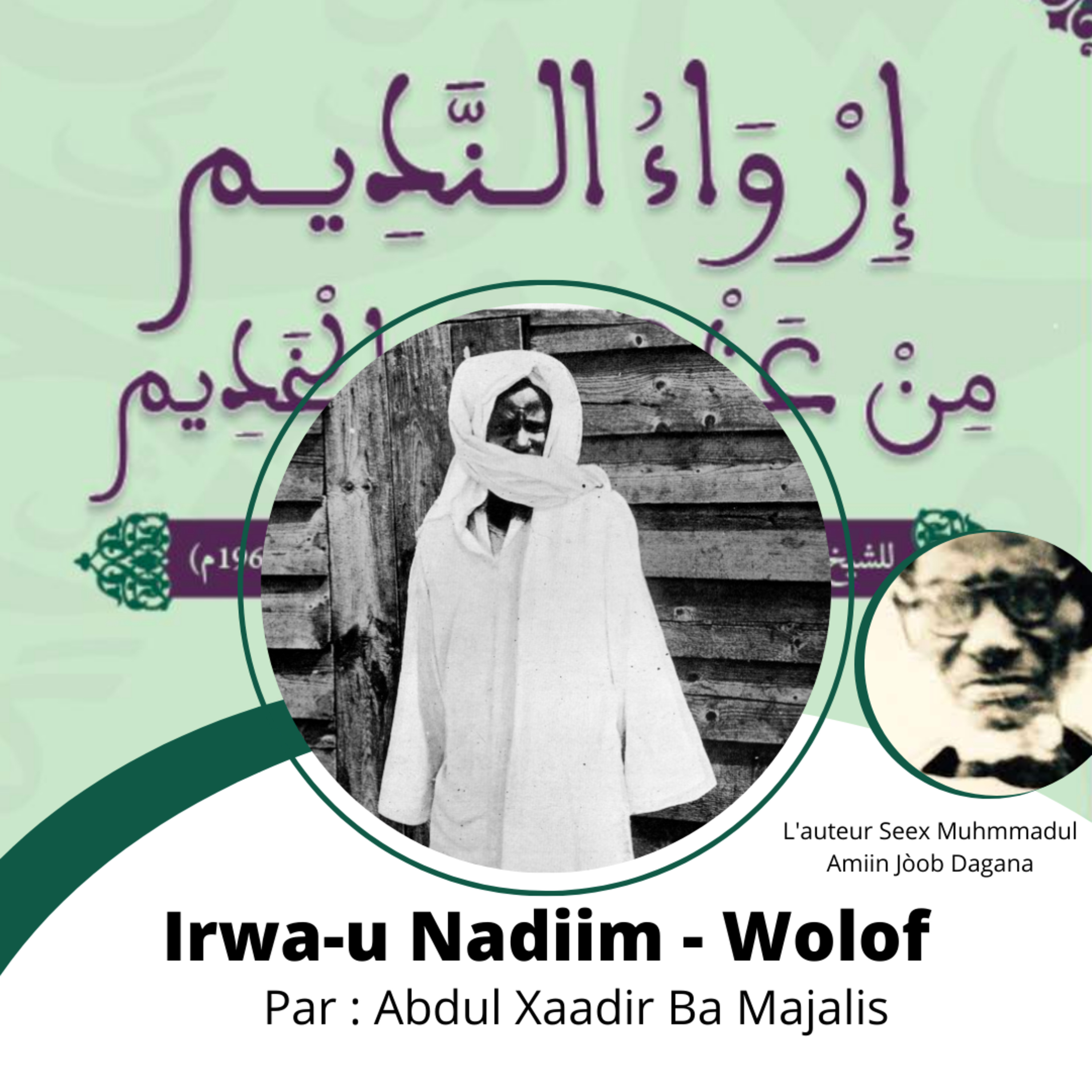
Librairie MajalisIrwaa-u Nadîm : Leçon 14 - Nekkug Sëriñ bi NJARÉEM (résidence surveillé du Cheikh à Diourbel P2)Cette biographie du Cheikh Ahmadou BAMBA (1853-1927), dont le manuscrit arabe est rédigé en 1963 dans un arabe très classique mais clair, comprend 285 pages (Version Rabita AL-KHADÎMIYYAH) et est divisée en 10 chapitres. Son auteur lui a donné le titre de IRWÂ-U- NADÎM MIN' AZHBI HUBB AL- KHADÎM (L'Abreuvement du Commensal dans la Douce Source d’amour du Serviteur) titre assez révélateur du caractère un peu laudatif de son ouvrage qu'il a écrit dans le but de faire connaître le Saint de ce XIVème siècle de l'Hégire (XXème siècle) et de...
2024-02-1327 min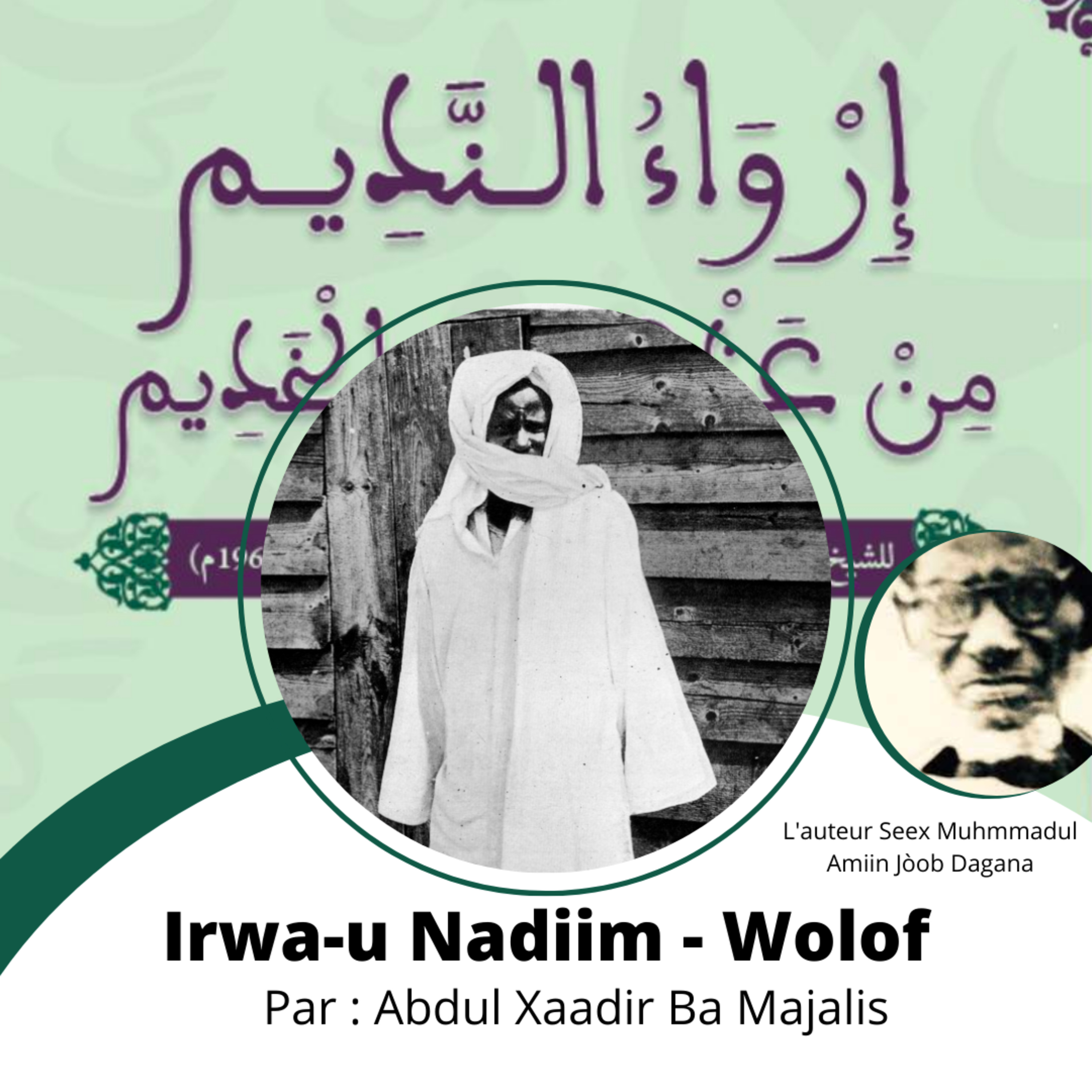
Librairie Majalis#Irwaa_u_Nadîm : Leçon 13 - Nekkug Sëriñ bi NJARÉEM (résidence surveillé du Cheikh à Diourbel) Partie 1Cette biographie du Cheikh Ahmadou BAMBA (1853-1927), dont le manuscrit arabe est rédigé en 1963 dans un arabe très classique mais clair, comprend 285 pages (Version Rabita AL-KHADÎMIYYAH) et est divisée en 10 chapitres. Son auteur lui a donné le titre de IRWÂ-U- NADÎM MIN' AZHBI HUBB AL- KHADÎM (L'Abreuvement du Commensal dans la Douce Source d’amour du Serviteur) titre assez révélateur du caractère un peu laudatif de son ouvrage qu'il a écrit dans le but de faire connaître le Saint de ce XIVème siècle de l'Hégire (XXème siècle) et de...
2024-02-1327 min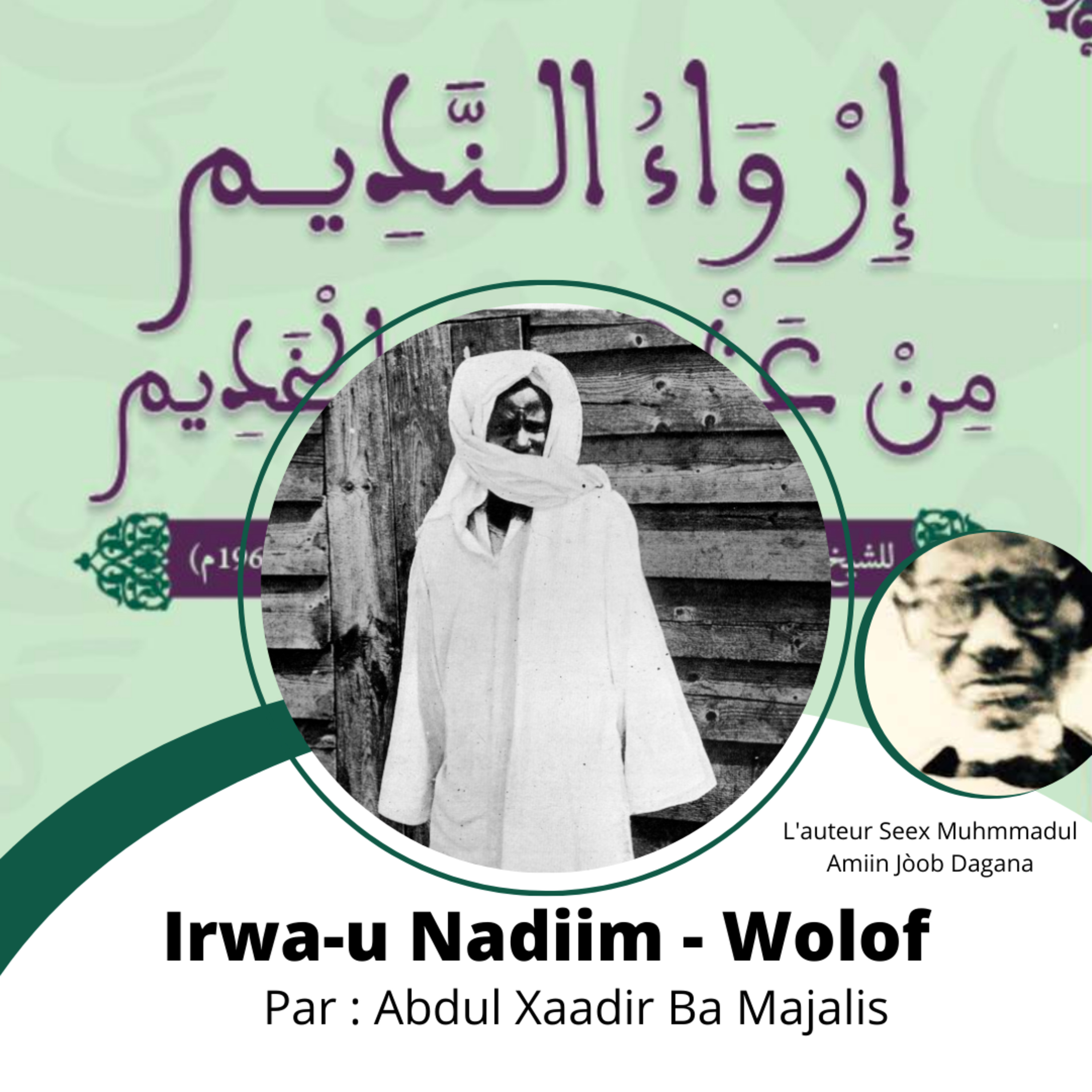
Librairie Majalis#Irwaa_u_Nadîm : Leçon 12 -Gànnaar-Senegaal (retour du Cheikh au Sénégal après l'exil du Mauritanie)Cette biographie du Cheikh Ahmadou BAMBA (1853-1927), dont le manuscrit arabe est rédigé en 1963 dans un arabe très classique mais clair, comprend 285 pages (Version Rabita AL-KHADÎMIYYAH) et est divisée en 10 chapitres. Son auteur lui a donné le titre de IRWÂ-U- NADÎM MIN' AZHBI HUBB AL- KHADÎM (L'Abreuvement du Commensal dans la Douce Source d’amour du Serviteur) titre assez révélateur du caractère un peu laudatif de son ouvrage qu'il a écrit dans le but de faire connaître le Saint de ce XIVème siècle de l'Hégire (XXème siècle) et de...
2024-02-1306 min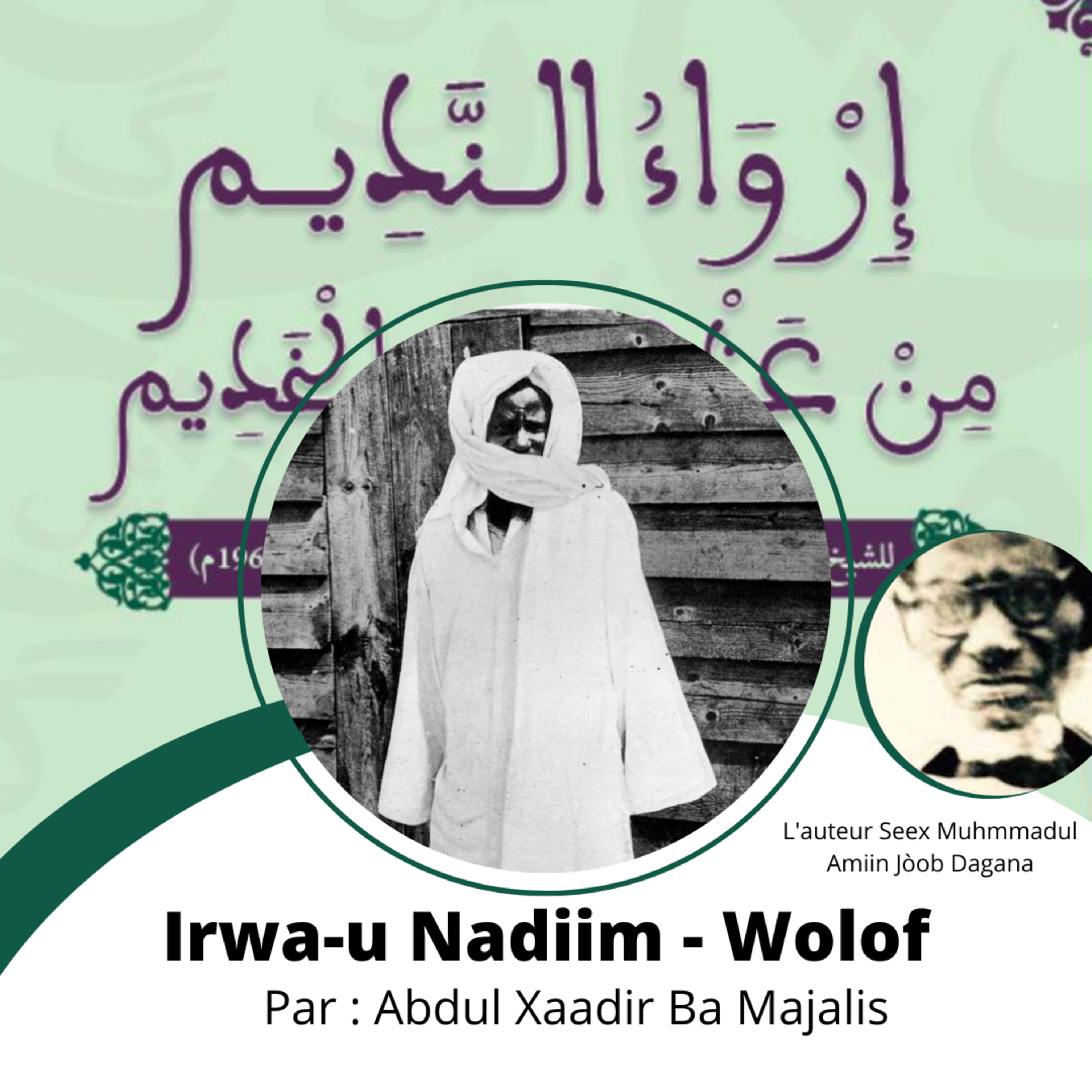
Librairie Majalis#Irwaa_u_Nadîm : Leçon 11 - Tukkib Sëriñ bi Gànnaar (L'Exil de Cheikh A. Bamba en Mauritanie)- Partie 2Cette biographie du Cheikh Ahmadou BAMBA (1853-1927), dont le manuscrit arabe est rédigé en 1963 dans un arabe très classique mais clair, comprend 285 pages (Version Rabita AL-KHADÎMIYYAH) et est divisée en 10 chapitres. Son auteur lui a donné le titre de IRWÂ-U- NADÎM MIN' AZHBI HUBB AL- KHADÎM (L'Abreuvement du Commensal dans la Douce Source d’amour du Serviteur) titre assez révélateur du caractère un peu laudatif de son ouvrage qu'il a écrit dans le but de faire connaître le Saint de ce XIVème siècle de l'Hégire (XXème siècle) et de...
2024-02-1337 min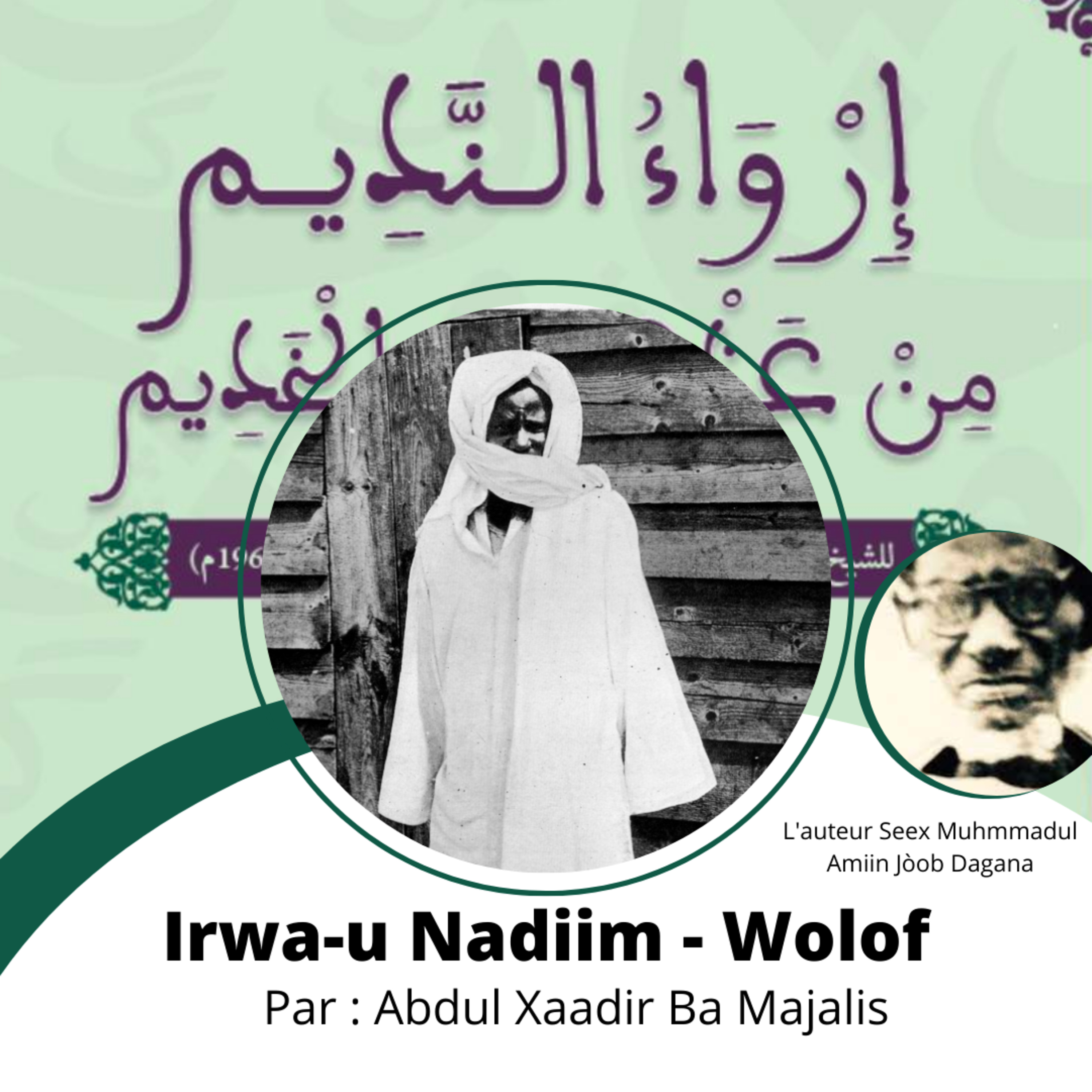
Librairie Majalis#Irwaa_u_Nadîm : Leçon 10 - Tukkib Sëriñ bi Gànnaar (L'Exil de Cheikh A. Bamba en Mauritanie )- Partie 1Cette biographie du Cheikh Ahmadou BAMBA (1853-1927), dont le manuscrit arabe est rédigé en 1963 dans un arabe très classique mais clair, comprend 285 pages (Version Rabita AL-KHADÎMIYYAH) et est divisée en 10 chapitres. Son auteur lui a donné le titre de IRWÂ-U- NADÎM MIN' AZHBI HUBB AL- KHADÎM (L'Abreuvement du Commensal dans la Douce Source d’amour du Serviteur) titre assez révélateur du caractère un peu laudatif de son ouvrage qu'il a écrit dans le but de faire connaître le Saint de ce XIVème siècle de l'Hégire (XXème siècle) et de...
2024-02-1327 min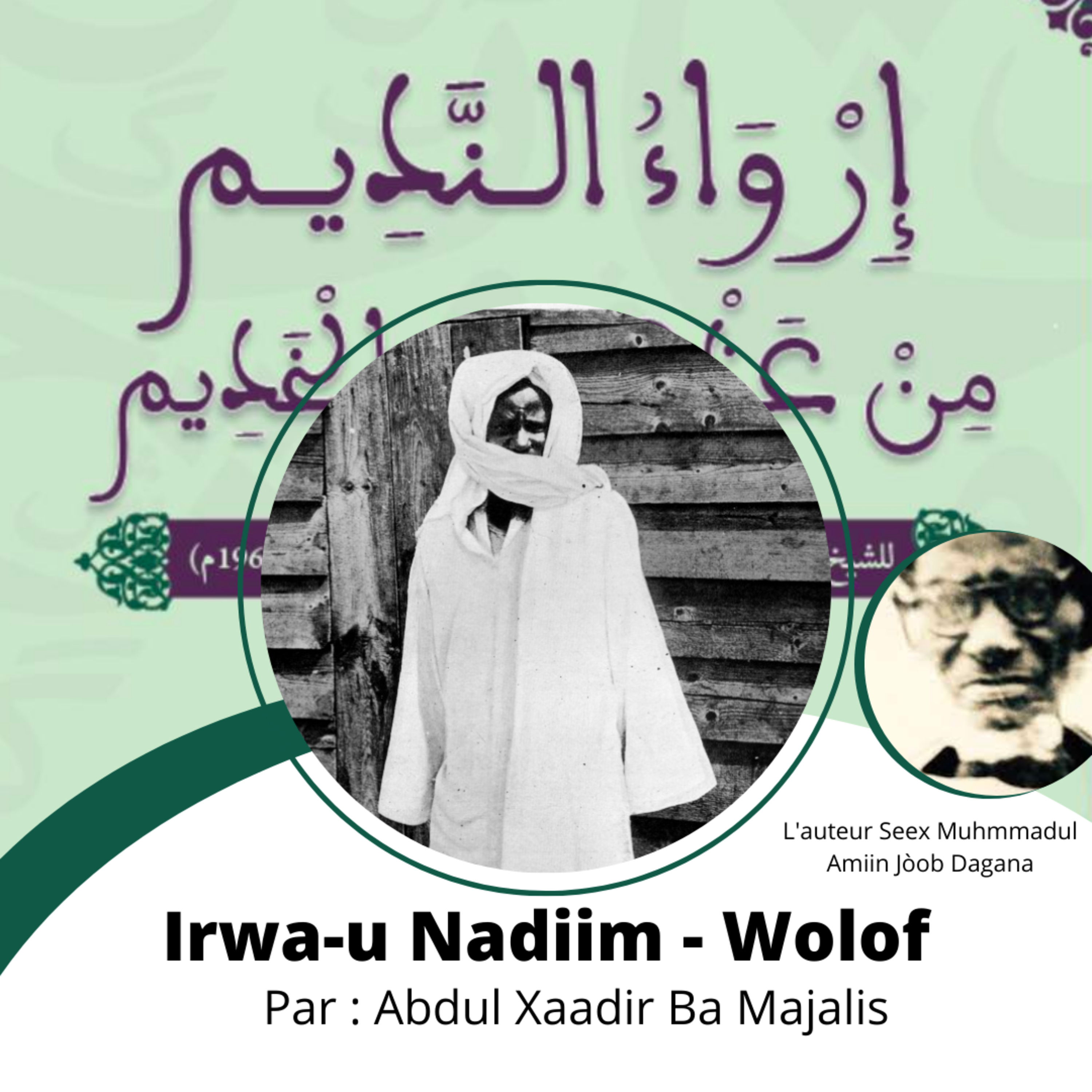
Librairie Majalis#Irwaa_u_Nadìm : Leçon 9 - Ñibbisig Sëriñ Tuubaa Senegaal (Le retour de Cheikhoul Khadîm au Sénégal)Cette biographie du Cheikh Ahmadou BAMBA (1853-1927), dont le manuscrit arabe est rédigé en 1963 dans un arabe très classique mais clair, comprend 285 pages (Version Rabita AL-KHADÎMIYYAH) et est divisée en 10 chapitres. Son auteur lui a donné le titre de IRWÂ-U- NADÎM MIN' AZHBI HUBB AL- KHADÎM (L'Abreuvement du Commensal dans la Douce Source d’amour du Serviteur) titre assez révélateur du caractère un peu laudatif de son ouvrage qu'il a écrit dans le but de faire connaître le Saint de ce XIVème siècle de l'Hégire (XXème siècle) et de...
2024-02-1321 min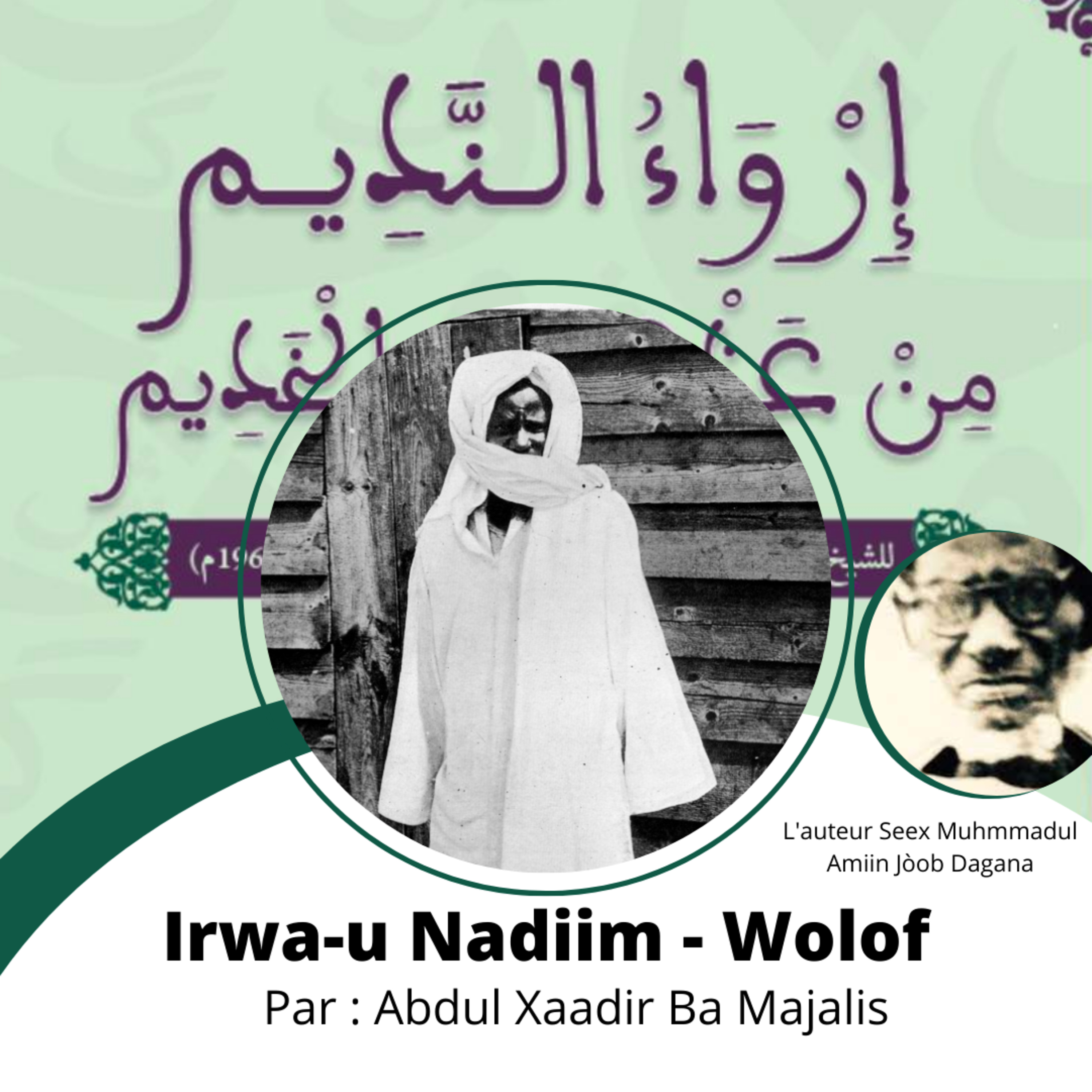
Librairie Majalis#Irwaa_u_Nadìm : Leçon 8 - Dakaar-Gabon (L'embarquement du Cheikh à destination Gabon) - Partie 2)Cette biographie du Cheikh Ahmadou BAMBA (1853-1927), dont le manuscrit arabe est rédigé en 1963 dans un arabe très classique mais clair, comprend 285 pages (Version Rabita AL-KHADÎMIYYAH) et est divisée en 10 chapitres. Son auteur lui a donné le titre de IRWÂ-U- NADÎM MIN' AZHBI HUBB AL- KHADÎM (L'Abreuvement du Commensal dans la Douce Source d’amour du Serviteur) titre assez révélateur du caractère un peu laudatif de son ouvrage qu'il a écrit dans le but de faire connaître le Saint de ce XIVème siècle de l'Hégire (XXème siècle) et de...
2024-02-1328 min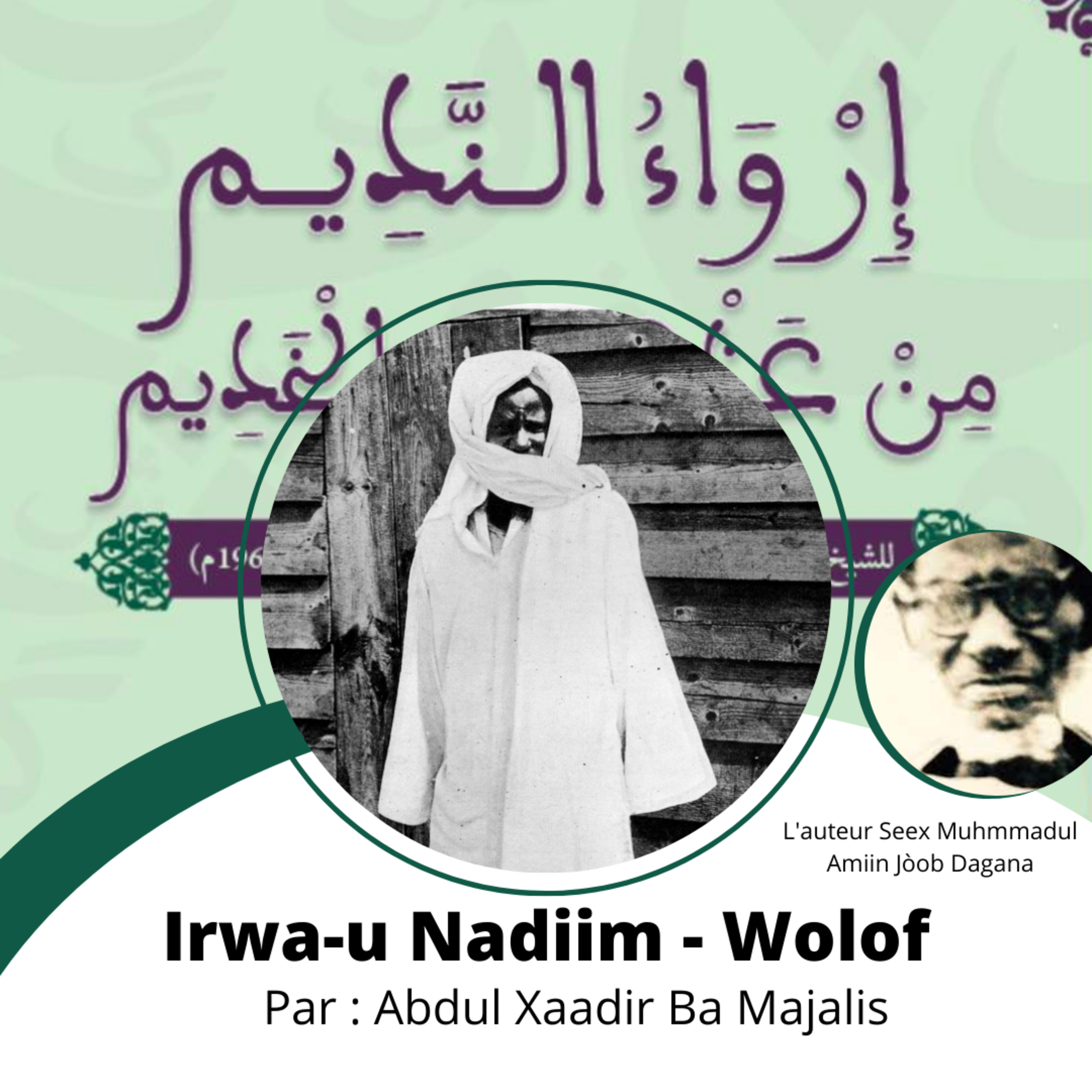
Librairie Majalis#Irwaa_u_Nadìm : Leçon 7 - Dakaar-Gabon (L'embarquement du Cheikh à destination Gabon) - Partie 1Cette biographie du Cheikh Ahmadou BAMBA (1853-1927), dont le manuscrit arabe est rédigé en 1963 dans un arabe très classique mais clair, comprend 285 pages (Version Rabita AL-KHADÎMIYYAH) et est divisée en 10 chapitres. Son auteur lui a donné le titre de IRWÂ-U- NADÎM MIN' AZHBI HUBB AL- KHADÎM (L'Abreuvement du Commensal dans la Douce Source d’amour du Serviteur) titre assez révélateur du caractère un peu laudatif de son ouvrage qu'il a écrit dans le but de faire connaître le Saint de ce XIVème siècle de l'Hégire (XXème siècle) et de...
2024-02-1336 min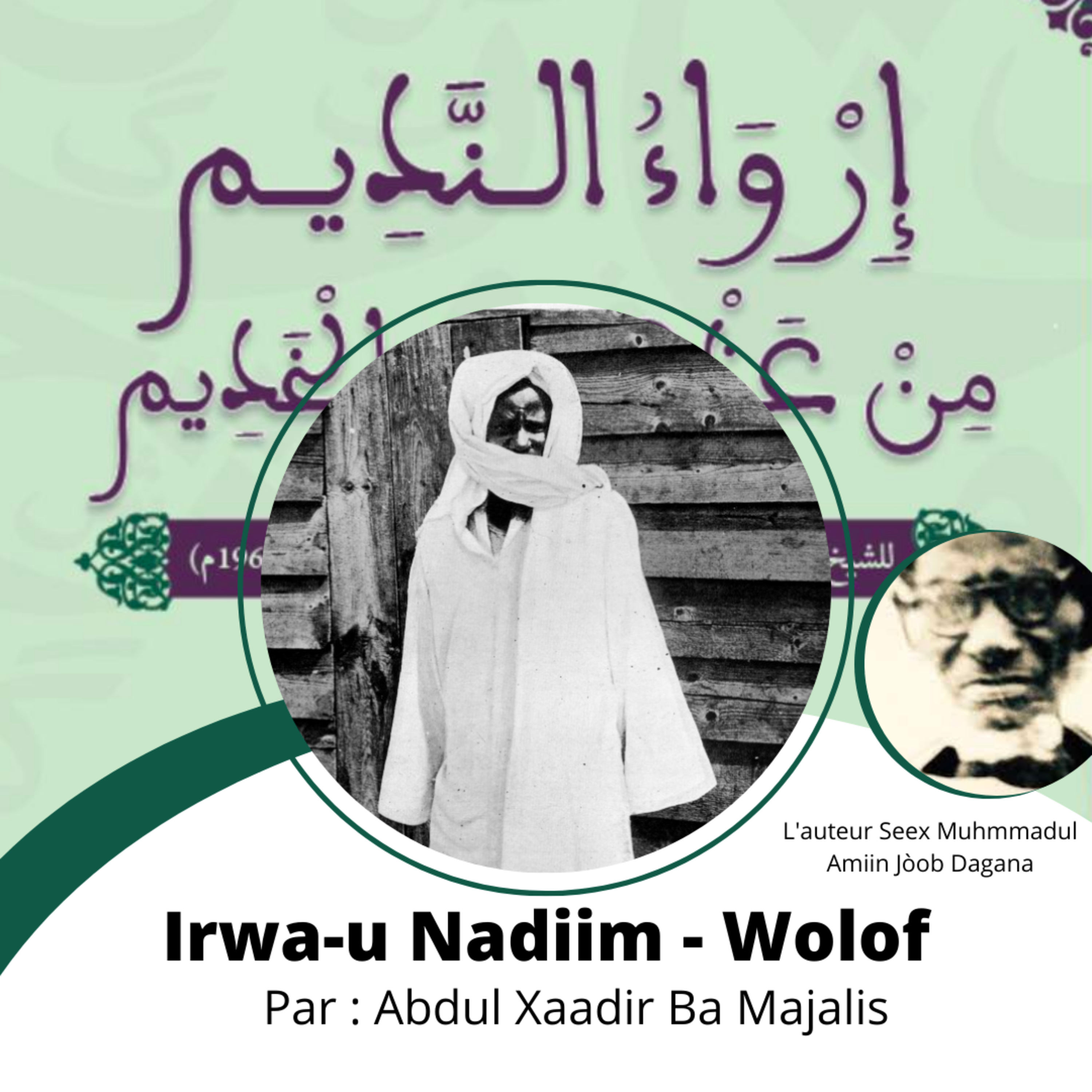
Librairie Majalis#Irwaa_u_Nadìm : Leçon 6 - Yoonu Géej gi (La déportation de Cheikh Ahmadou Bamba)Cette biographie du Cheikh Ahmadou BAMBA (1853-1927), dont le manuscrit arabe est rédigé en 1963 dans un arabe très classique mais clair, comprend 285 pages (Version Rabita AL-KHADÎMIYYAH) et est divisée en 10 chapitres. Son auteur lui a donné le titre de IRWÂ-U- NADÎM MIN' AZHBI HUBB AL- KHADÎM (L'Abreuvement du Commensal dans la Douce Source d’amour du Serviteur) titre assez révélateur du caractère un peu laudatif de son ouvrage qu'il a écrit dans le but de faire connaître le Saint de ce XIVème siècle de l'Hégire (XXème siècle) et de...
2024-02-1345 min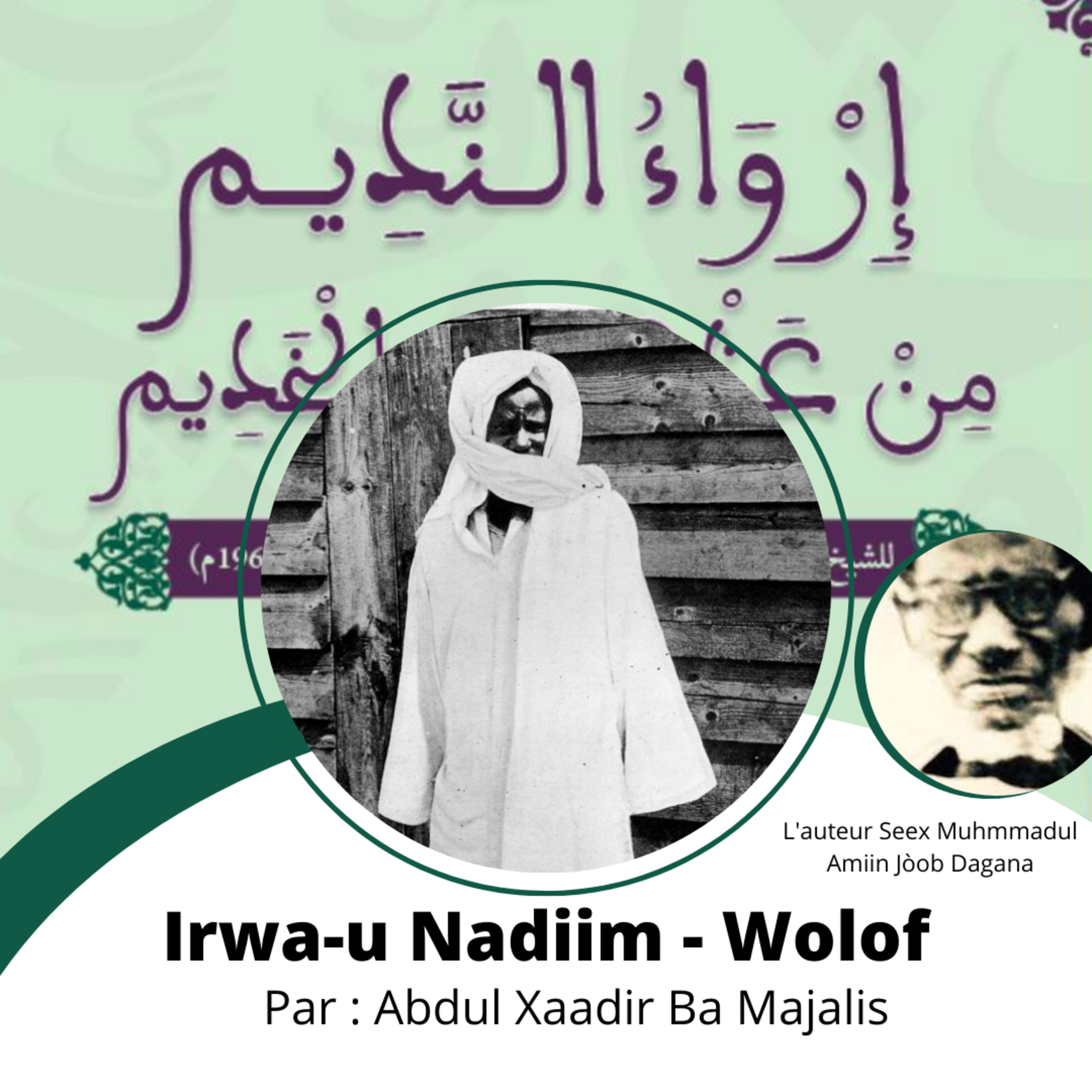
Librairie Majalis#Irwaa_u_Nadìm : Leçon 5 - Tukkib Jolof bi (Le départ de Cheikh A. Bamba pour le Dioulof)Cette biographie du Cheikh Ahmadou BAMBA (1853-1927), dont le manuscrit arabe est rédigé en 1963 dans un arabe très classique mais clair, comprend 285 pages (Version Rabita AL-KHADÎMIYYAH) et est divisée en 10 chapitres. Son auteur lui a donné le titre de IRWÂ-U- NADÎM MIN' AZHBI HUBB AL- KHADÎM (L'Abreuvement du Commensal dans la Douce Source d’amour du Serviteur) titre assez révélateur du caractère un peu laudatif de son ouvrage qu'il a écrit dans le but de faire connaître le Saint de ce XIVème siècle de l'Hégire (XXème siècle) et de...
2024-02-1317 min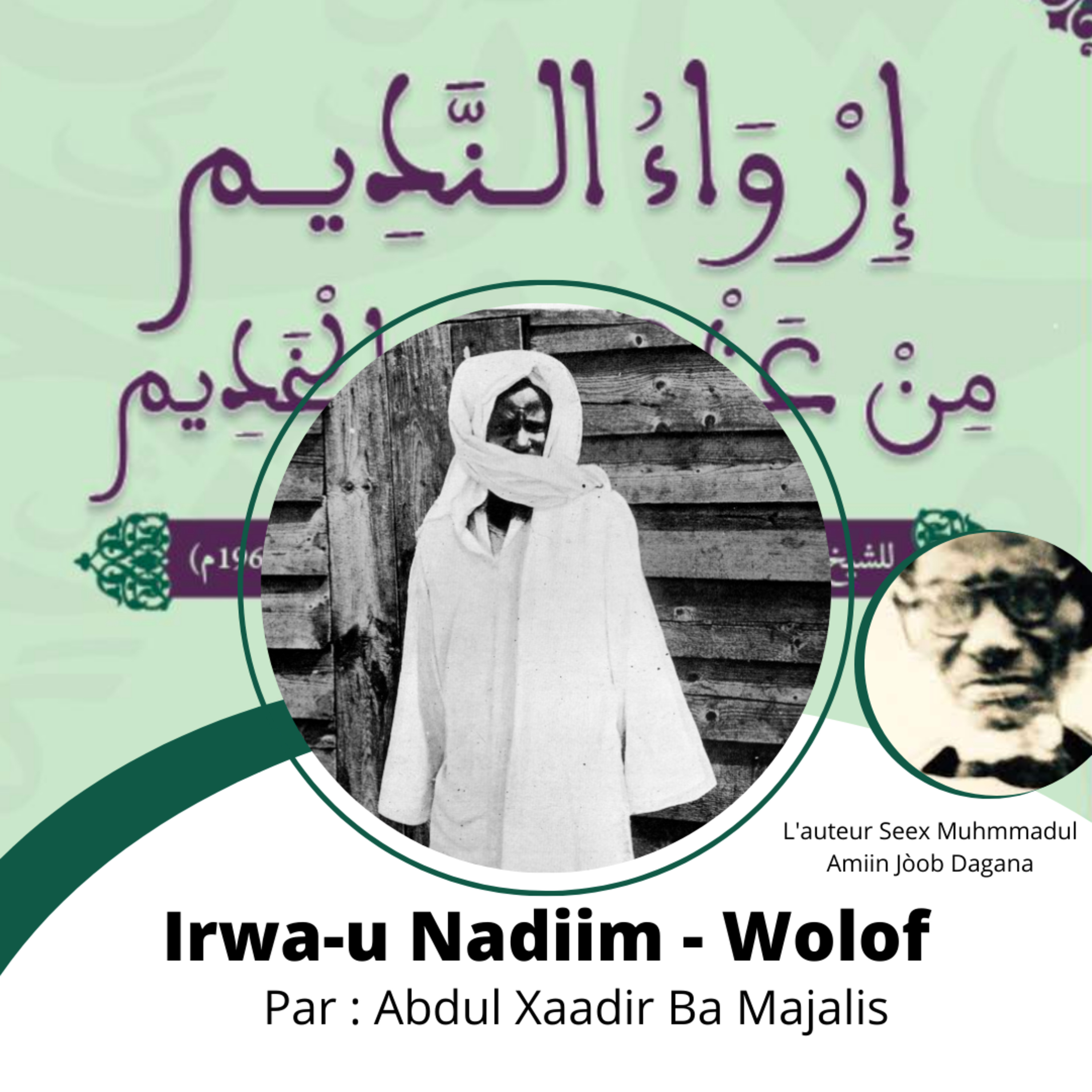
Librairie Majalis#Irwaa_u_Nadìm : Leçon 4 Dundug Sëriñ bi, ginaaw M. Mor (Le Cheikh après la disparition de son Père)Cette biographie du Cheikh Ahmadou BAMBA (1853-1927), dont le manuscrit arabe est rédigé en 1963 dans un arabe très classique mais clair, comprend 285 pages (Version Rabita AL-KHADÎMIYYAH) et est divisée en 10 chapitres. Son auteur lui a donné le titre de IRWÂ-U- NADÎM MIN' AZHBI HUBB AL- KHADÎM (L'Abreuvement du Commensal dans la Douce Source d’amour du Serviteur) titre assez révélateur du caractère un peu laudatif de son ouvrage qu'il a écrit dans le but de faire connaître le Saint de ce XIVème siècle de l'Hégire (XXème siècle) et de...
2024-02-1320 min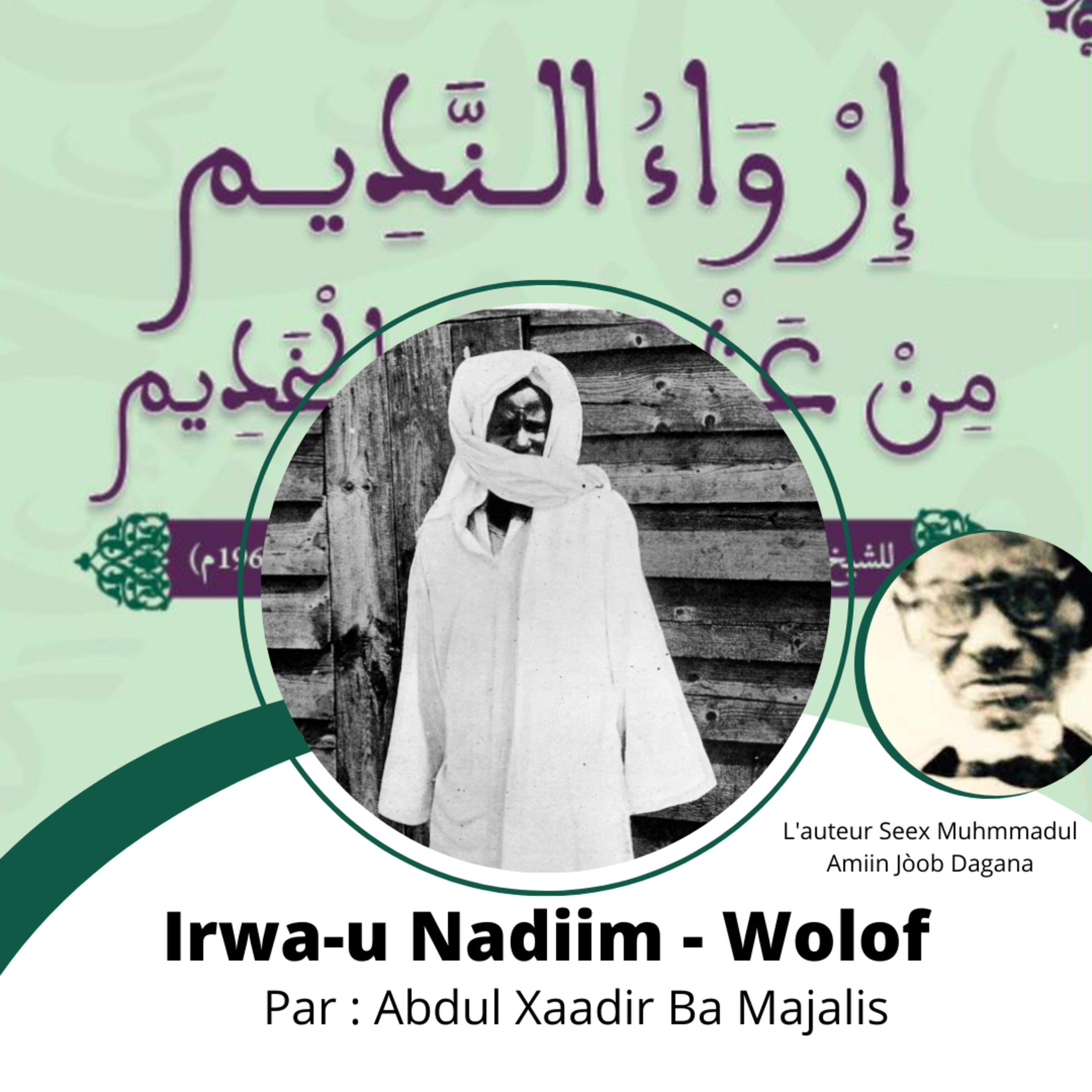
Librairie Majalis#Irwaa_u_Nadìm : Leçon3 Dundug Sëriñ bi, ginaaw M. Moor (Le Cheikh après la disparition de son Père)Cette biographie du Cheikh Ahmadou BAMBA (1853-1927), dont le manuscrit arabe est rédigé en 1963 dans un arabe très classique mais clair, comprend 285 pages (Version Rabita AL-KHADÎMIYYAH) et est divisée en 10 chapitres. Son auteur lui a donné le titre de IRWÂ-U- NADÎM MIN' AZHBI HUBB AL- KHADÎM (L'Abreuvement du Commensal dans la Douce Source d’amour du Serviteur) titre assez révélateur du caractère un peu laudatif de son ouvrage qu'il a écrit dans le but de faire connaître le Saint de ce XIVème siècle de l'Hégire (XXème siècle) et de...
2024-02-1330 min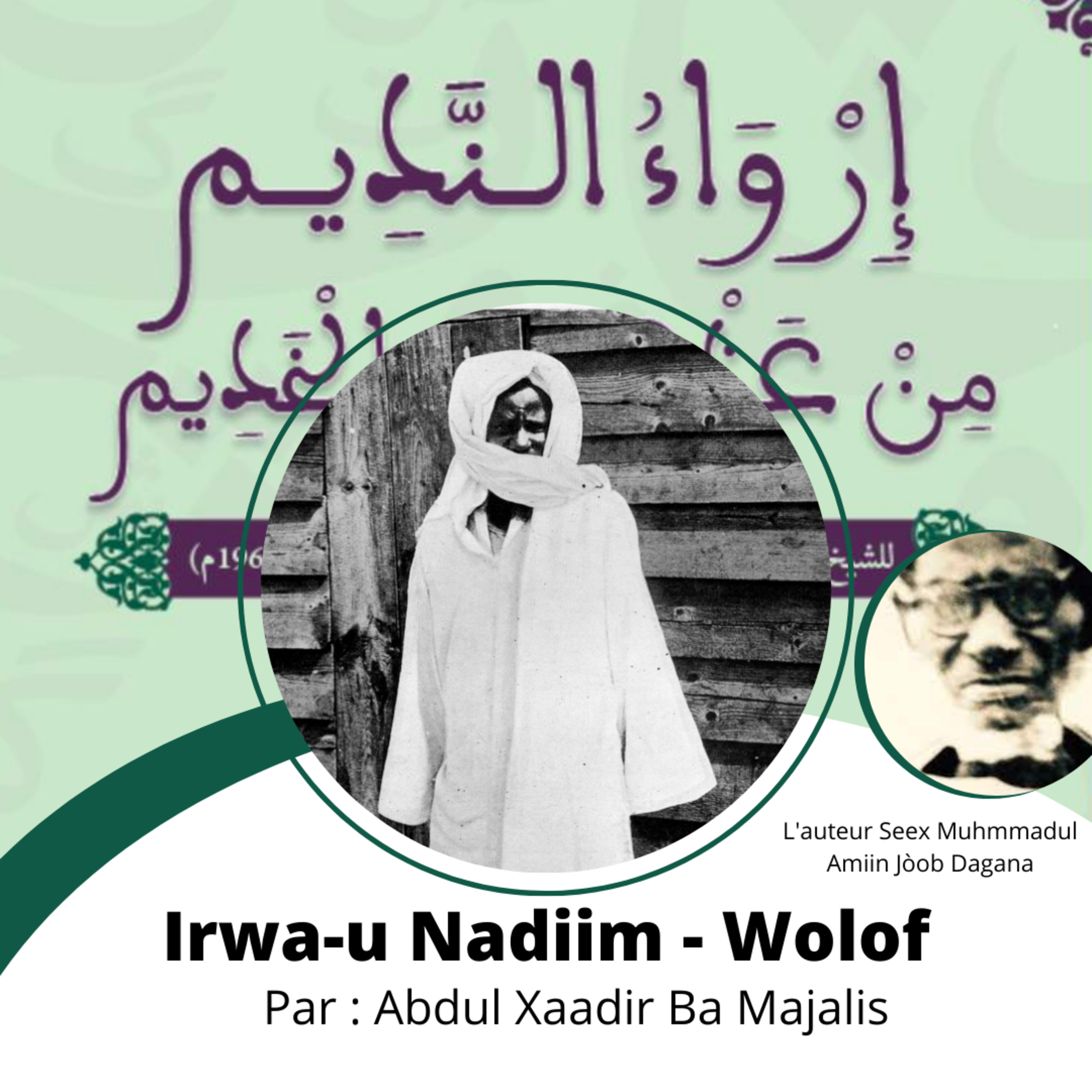
Librairie Majalis#Irwaa_u_Nadîm : Leçon 2- Gane àddunag Sëriñ Tuubaa 1853, ba ci làqug Maam Moor Anta Sali 1882Cette biographie du Cheikh Ahmadou BAMBA (1853-1927), dont le manuscrit arabe est rédigé en 1963 dans un arabe très classique mais clair, comprend 285 pages (Version Rabita AL-KHADÎMIYYAH) et est divisée en 10 chapitres. Son auteur lui a donné le titre de IRWÂ-U- NADÎM MIN' AZHBI HUBB AL- KHADÎM (L'Abreuvement du Commensal dans la Douce Source d’amour du Serviteur) titre assez révélateur du caractère un peu laudatif de son ouvrage qu'il a écrit dans le but de faire connaître le Saint de ce XIVème siècle de l'Hégire (XXème siècle) et de...
2024-02-1321 min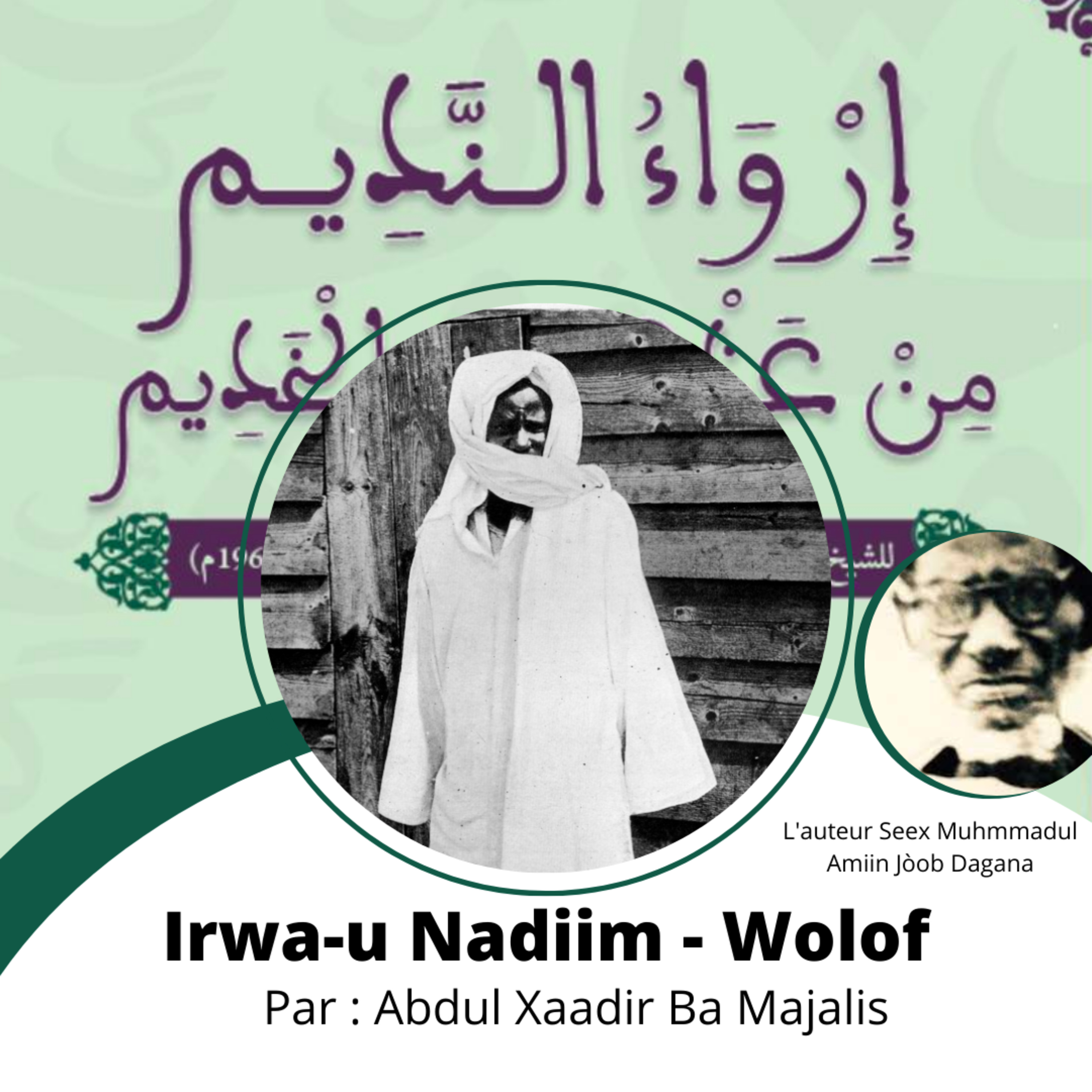
Librairie Majalis#Irwâ_u_Nadîm : Leçon 1- Ubbiteg Téere bi (Introduction)Cette biographie du Cheikh Ahmadou BAMBA (1853-1927), dont le manuscrit arabe est rédigé en 1963 dans un arabe très classique mais clair, comprend 285 pages (Version Rabita AL-KHADÎMIYYAH) et est divisée en 10 chapitres. Son auteur lui a donné le titre de IRWÂ-U- NADÎM MIN' AZHBI HUBB AL- KHADÎM (L'Abreuvement du Commensal dans la Douce Source d’amour du Serviteur) titre assez révélateur du caractère un peu laudatif de son ouvrage qu'il a écrit dans le but de faire connaître le Saint de ce XIVème siècle de l'Hégire (XXème siècle) et de...
2024-02-1308 min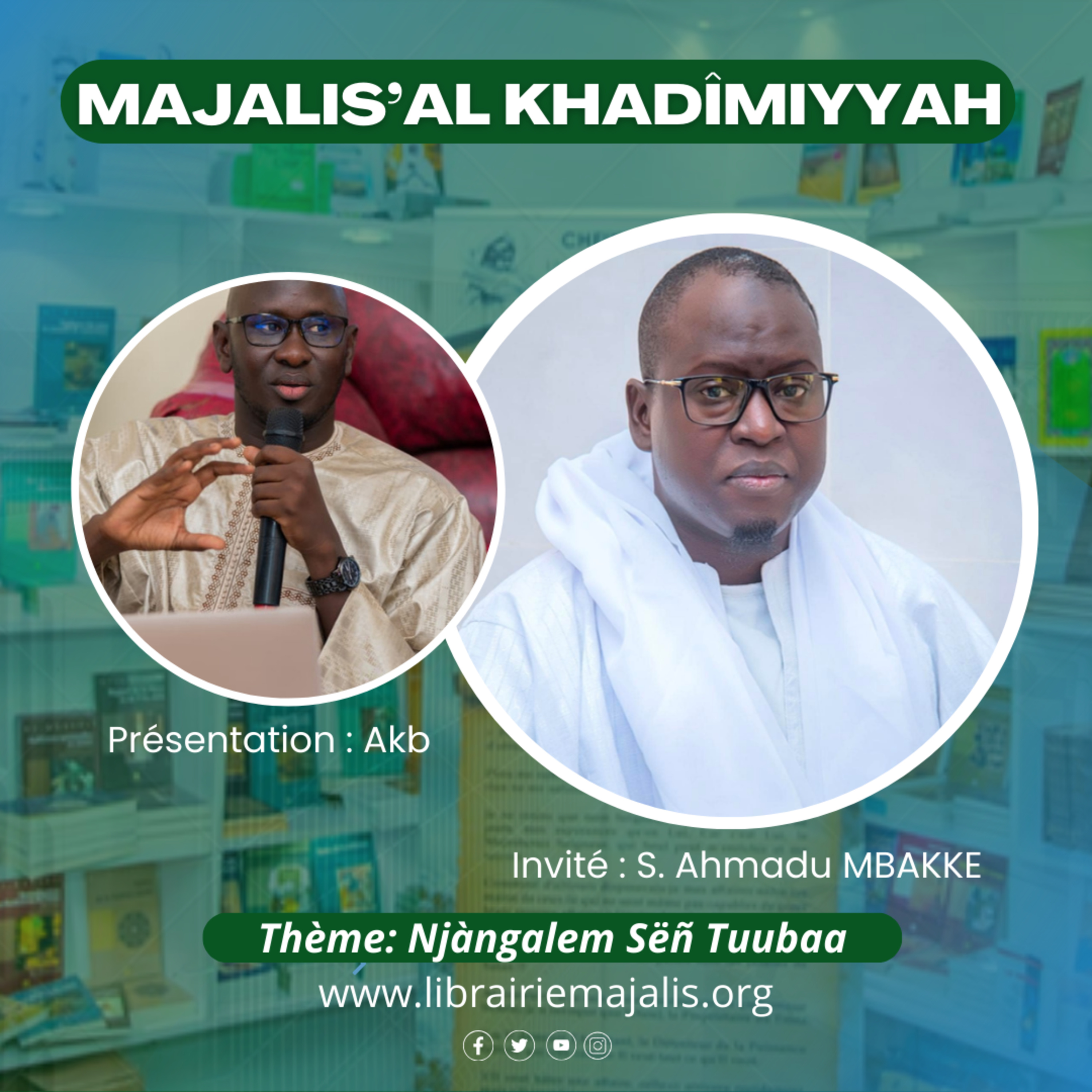
Librairie MajalisMajalis_Al_Khadimiyyah | Thème: Lan mooy Njàngalem Sëriñ Tuubaa?Ay leeral ci « lan mooy njàngalem Sëriñ Tuubaa? »Ci Tawhiid, ak Fiqh ak Tasawuf, ak methode bi ko Sëriñ bi jaareÑu àndoon ko ak Seex Ahmadu Mbàke Daarul Muhti
2023-11-051h 10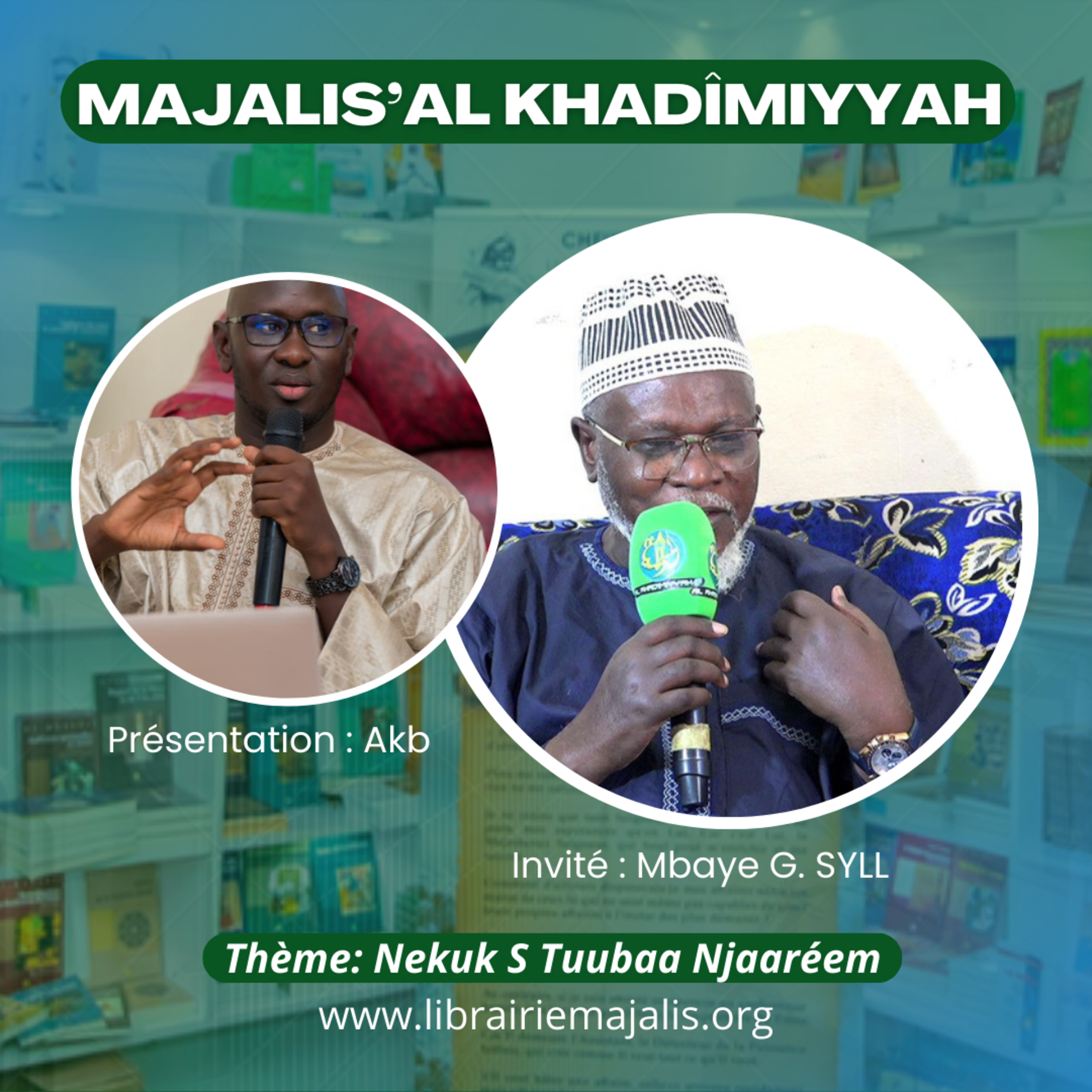
Librairie MajalisMajalis_Al_Khadimiyyah | Thème: Nekuk S Tuubaa NjaaréemWaxtaan wu am solo, ci 4i tomb yu aju ci dundug Sëriñ bi ci Njaaréem - Lu waral Tubaab yi tànn Njaareem, comme résidence survéller?- Lu waraloon Murid yi participé ci guerre 14-18 bi?- Lu wara participation 500 yi Sëriñ bi joxoon Tubaab yi?- Lu wara Ecole francaise bi woon ci Njaaréem?Nu ànd ko ak Baay Mbaye Gueye Syll
2023-10-2259 min
Majalis al Hikma - Syedna Taher Fakhruddin TUSQur’an Ni Ayato Ni Ma’aani Tehqeeqan Kem Jaani Sakaai? (Dawat ni Zabaan) - Majalis al HikmaDawat ni Zabaan ma dekho: https://youtu.be/MP1A1ycSlCA
Qur’an-e-Majeed ma Khuda Ta’ala farmawe chhe “Qur’an nu ta’weel Khuda ane je ‘ilm ma khuchela huwa logo chhe, ye jaane chhe.” Aa ayat si waazeh thaai chhe ke Qur’an ni ta’weel chhe. Zahir Qur’an su ke tanzeel, ehni ma’aani bil-haqeeqat su ke ta’weel.
Qur’an-e-Majeed ma Khuda Ta’ala haji farmawe chhe ke jo Qur’an jo Khuda na nazdeek si na hote to ehma ghano ikhtilaaf hote. To zahir ma to Qur’an ma ek ayat...
2023-10-1519 min
Librairie MajalisFiri Qasida Hasbuna'Lâhu (par Akb Majalis)Hasbuna'Lâhu, mooy Qasida gi Sëriñ Tuubaa bindoon keroog ba mu jogee Mbàkke Baari, ba tollu Jeewol
2023-10-1008 min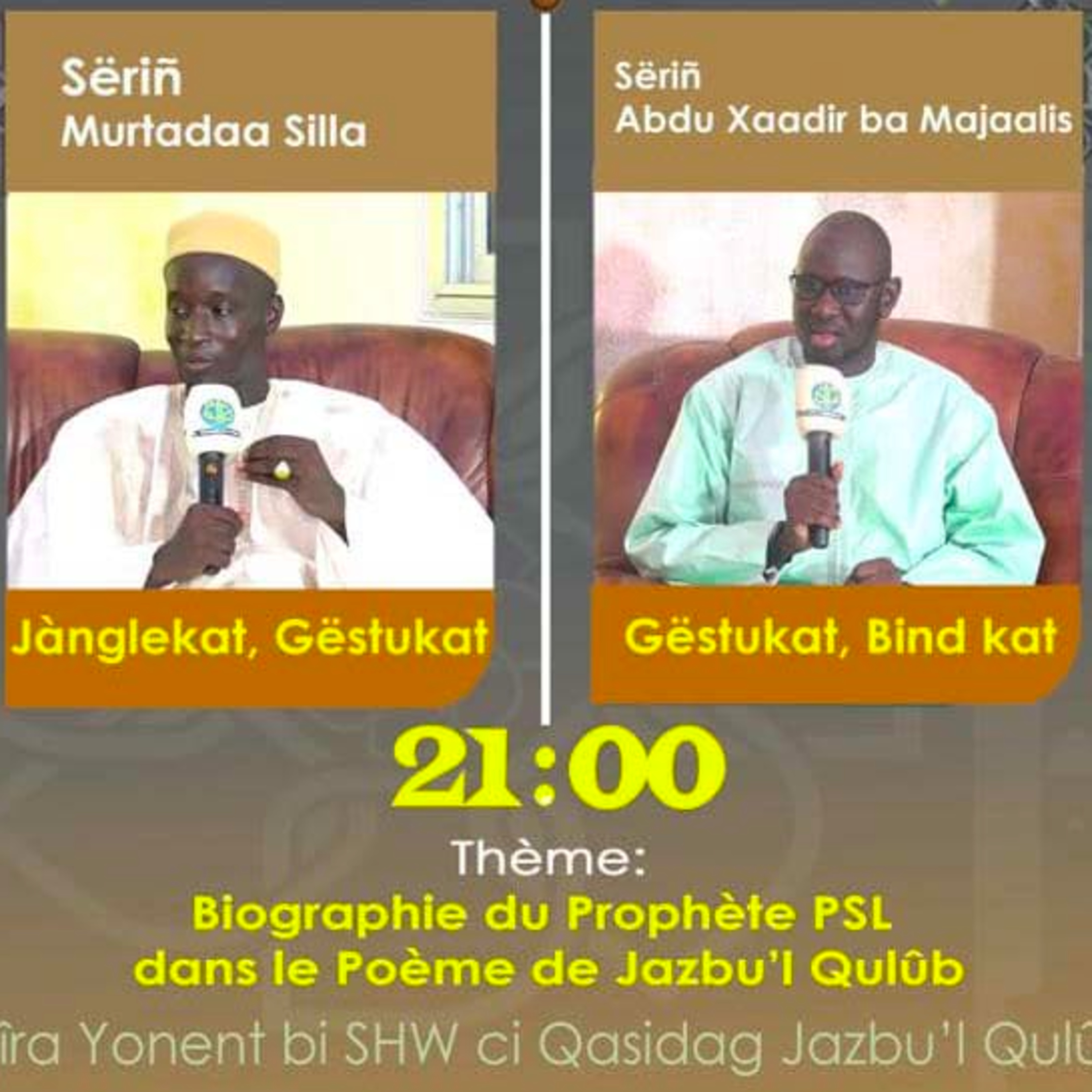
Librairie Majalis#Majalis'Al Khadîmiyyah : Jaar-jaari Yonent bi SHW ci Qasidag Jazbul Qulûb#Majalis'Al Khadîmiyyah : Jaar-jaari Yonent bi SHW ci Qasidag Jazbul Qulûb
Présentation : Akb Majalis
Invité : S. Murtada Sylla
2023-09-281h 01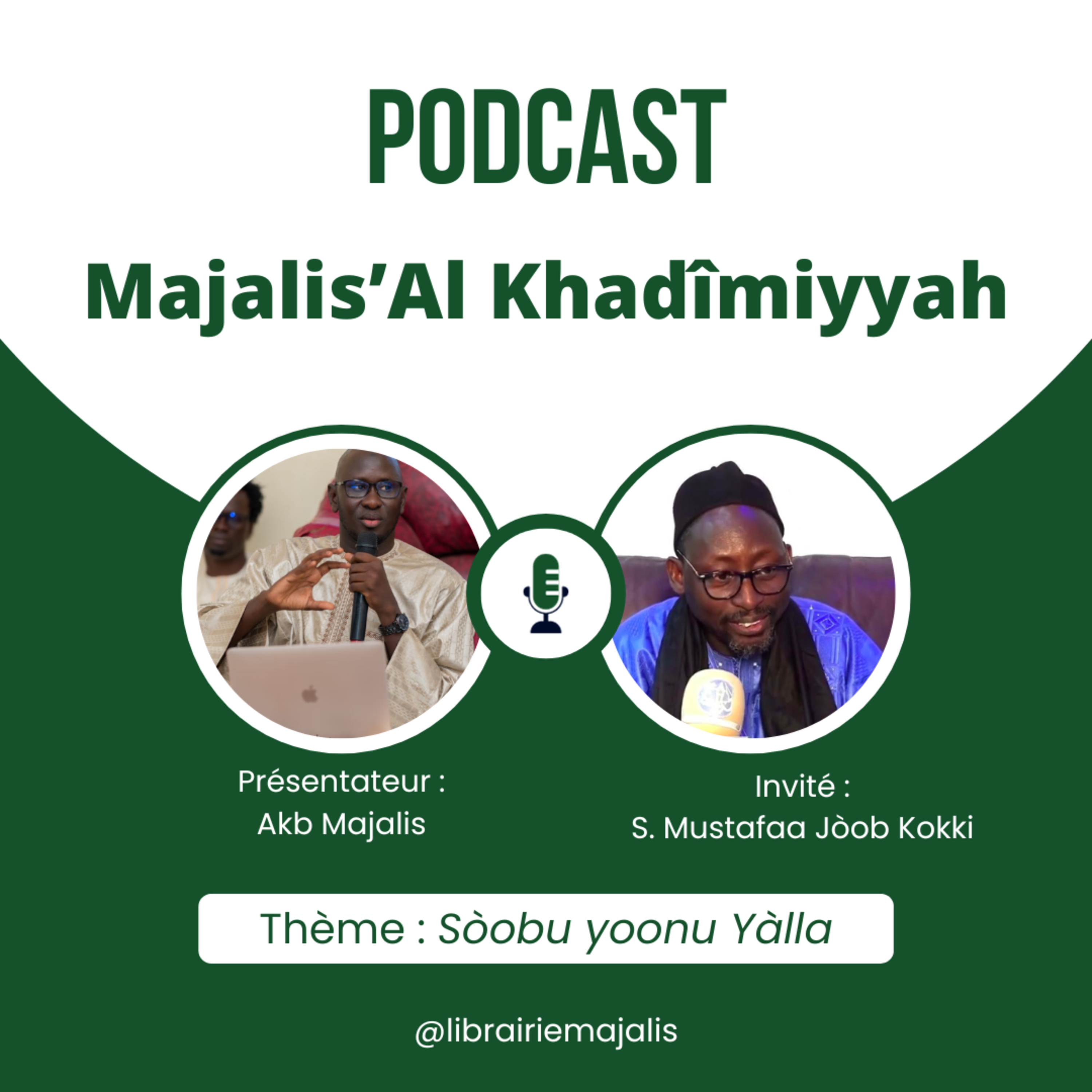
Librairie Majalis#Majalis'Al Khadîmiyyah : SòobuEmission #Majalis'Al Khadîmiyyah
Invité : Sëriñ Mustafaa Joob Al-kokki
Thème : Sòobu
2023-09-1952 min
Majalis al Hikma - Syedna Taher Fakhruddin TUSWhat is the True Meaning of Progress, and How is it Attained? (English) - Majalis al HikmaMajalis al Hikma: 78 | What is the true meaning of progress, and how is it attained?
Watch in English: https://youtu.be/J_XyUEir2H0
Watch in Arabic: https://youtu.be/Mdci2a65g8k
Every person desires progress. We want to rise, advance, and become better - this is part of our nature.
Most people understand progress in the context of technology - to make things faster: if a car can go from 0-60mph in three seconds instead of four seconds, tha...
2023-06-1515 min
Majalis al Hikma - Syedna Taher Fakhruddin TUSTaraqqi Ni Haqiqatan Ma'na Su Chhe? Ane Ye Kem Haasil Thaai? (Dawat ni Zabaan) - Majalis al HikmaDawat ni Zabaan ma dekho: https://youtu.be/tXXVrpcbykA
Insaan ni fitrat em chhe ke taraqqi pasand kare chhe - charhe, behtar thaai, progress thaai.
Aksar logo taraqqi - progress - ne ye nazar si dekhe chhe, technology ma khaas jaldi thaai, fast thaai, ye progress. Gaari 0-60mph chaar second na badle teen second ma pohnche, ye progress. Aa sagli cheezo ma faaydo lai sakaai chhe, magar insaan waaste haqiqatan taraqqi su chhe? Ane ye kem haasil thaai?
Majalis al Hikma ni 78 mi...
2023-06-0917 min
Majalis al Hikma - Syedna Taher Fakhruddin TUSHidayat Kona Si Le? Ane Sukaam? (Dawat ni Zabaan) - Majalis al HikmaMajalis al Hikma: 77 | Hidayat Kona Si Le? Ane Sukaam?
Dawat ni Zabaan ma dekho: https://youtu.be/Gdsc-uuGAe0
Jem aankh ma dekhwani quwwat chhe magar noor, roshni hoi to dekhi sake, yej misal aql ne hidayat ni zarurat chhe samajhwane. Ye hidayat kon aape? Em kem khabar parhe ke Haqq na Saheb kon chhe taake ehna si hidayat le?
Je zindagi na sagla si ahamm suaalo chhe – apan dunya ma sukaam janaaya chhe, zindagi no maqsad su chhe – ehna jawaabo, ehma hidayat kona si lewi...
2023-05-2716 min![Utcarádió [Tilos Rádió podcast]](https://tilos.hu/upload/episode-new/utcaradio.jpg)
Utcarádió [Tilos Rádió podcast]10 éves az ULE; Kelenföldi majális; Óbudai közösségTíz éves az Utcáról Lakásba! Egyesület, az ULE. Minden évben pár lakhatatlan önkormányzati lakást tesznek újra lakhatóvá, ahol utána a legelesettebbek tudnak otthonra találni. Hogy indult, mi változott ennyi idő alatt? Merre és meddig tovább? Az évfordulón az összegzésen túl van ünneplés is: aukciós kiállítás május 12-ig az Otthonmesék és a Könyvhajlék anyagaival a FUGA Budapesti Építészeti Központban. A Három Hollóban május 3-án újra megnézhető az Otthon cÍmű közösségi színházi előadás, amelybe...
2023-04-281h 30
Librairie MajalisPlateau sur Mame Cheikh Ibrahima FallPlateau sur Mame Cheikh Ibrahima Fall
Ivités : Serigne Afé Niang, Serigne Mame Cheikh Fall et Serigne Moustapha Fall
Presentation : Akb Majalis
2023-04-051h 24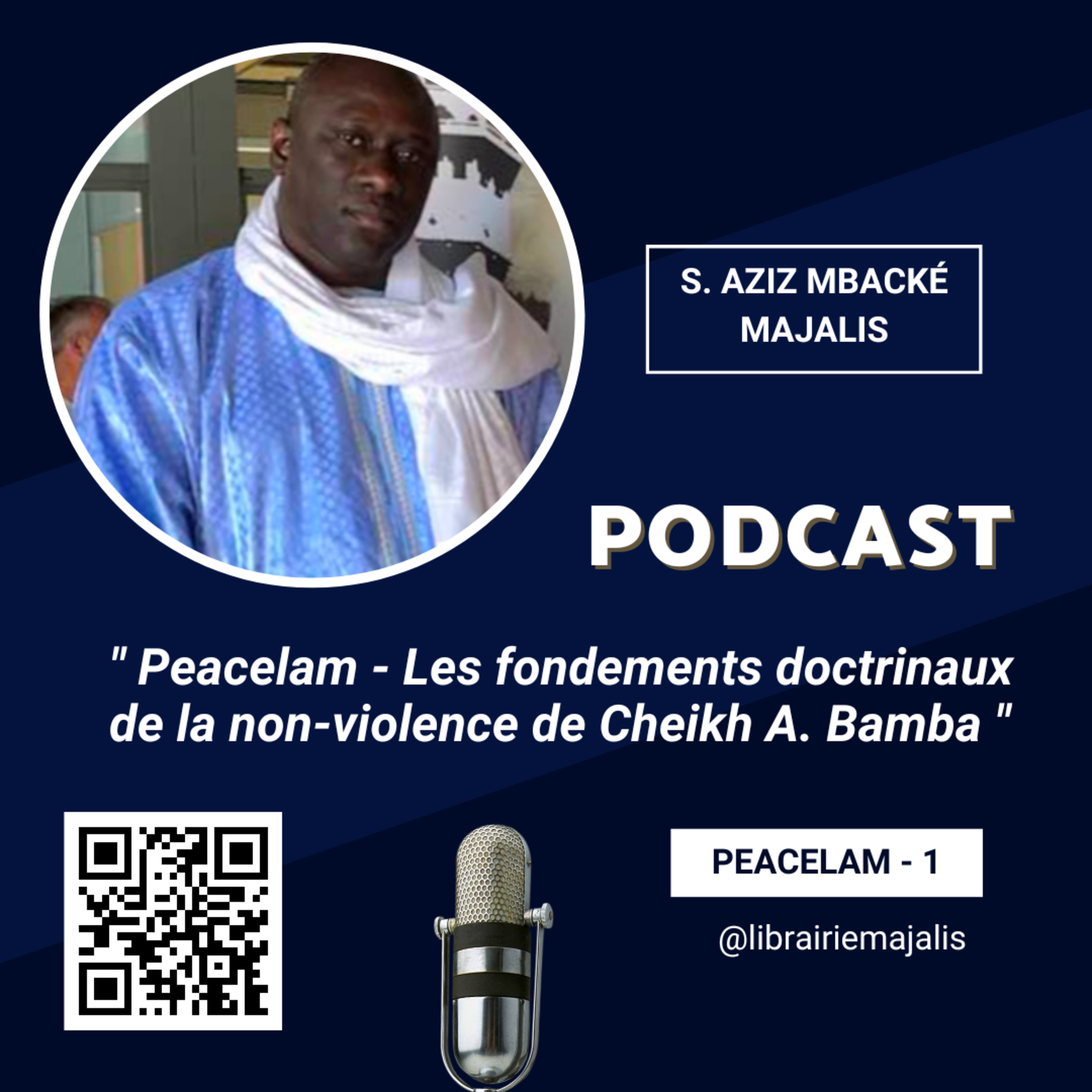
Librairie MajalisPeacelam - Les fondements doctrinaux de la non-violence de Cheikh A. Bamba (A. Aziz Mbacké Majalis) -Peacelam - Les fondements doctrinaux de la non-violence de Cheikh A. Bamba (A. Aziz Mbacké Majalis)
2023-04-0330 min
Shaykh-ul-Islam Dr Muhammad Tahir-ul-QadriMajalis-ul-ilm - (Lecture 1)Majalis-ul-ilm - (Lecture 1) by Shaykh-ul-Islam Dr. Muhammad Tahir-ul-Qadri
The Merits and Importance of the Sittings of Knowledge
عنوان: مجالسِ علم کی فضیلت و اہمیت
17 October, 2015
VCD: 2451
Lecture: Hn-1
Majalis-ul-Ilm
Majalis-ul-Ilam
Mjalis-ul-Ilm
مجلس العلم
مجالس العلم
حقیقت و ماہیت علم,
اصول و قواعد علم,
اہمیت و فضیلت علم,
ذرائع و دلائلِ علم,
اقسام و مراتب علم,
آداب و لوازمات علم,
حضور نبی اکرم کا مرتبہ علم,
حضور نبی اکرم کا نافذ کردہ نظام علم,
صحابہ تابعین اور اتباع تابعین کے ادوار میں مراکزِ علم,
قرون اولی میں اشاعت علم,
انسانی ثقافت
مجالس
مجالس علم
مجلس علم
طاہرالقادری
قادری
شیخ الاسلام
قرآن
فقہ
سُنہ
حدیث
علم
اہمیت
تاریخ
اسلامی تاریخ
مکہ
مدینہ
لیکچر
اردو
سیریز
صالحین
فضیلت
فضیلت علم
منہاج
سیرت
روحانیت
The reality and fundamental structure of knowledge
Principles of knowledge
Merits and importance of knowledge
Sources and e...
2022-12-111h 22
Székelyhon AktuálisIdén a városi park lesz a székelyudvarhelyi majális helyszíneA járványidőszak alatt – számtalan megszokott rendezvényhez hasonlóan – elmaradt a városi majális Székelyudvarhelyen is. Idén újra megszervezik: a reggeli fúvós ébresztő, a biciklis felvonulás továbbra is megadja az ünnepség keretét. Az eseménynek ezúttal azonban nem Szejkefürdő ad otthont, hanem beköltözik a városi parkba. (Forrás: Székelyhon.ro → https://szekelyhon.ro/aktualis/iden-a-varosi-park-lesz-a-szekelyudvarhelyi-majalis-helyszine?fbclid=IwAR2oV3py8a0VMALEpqLHAyyxFlU__aeAg8EF9wzI9TSANHQfV0PkmLC3iXY)
2022-04-2102 min 2022-04-0825 min
2022-04-0825 min
Majalis al Hikma - Syedna Taher Fakhruddin TUSHow did the Sulaymani faction split off from haqq? (Part 3 - English) - Majalis al HikmaIn this Majlis Syedna Taher Fakhruddin TUS continues to address the split of the Sulaymani faction. In the previous Majlis Syedna explained that the Sulaymani faction were led astray by the false claimant Sulayman bin Hasan, the grandson of the 24th Dai, in the time of the 27th Dai al-Mutlaq Syedna Dawood bin Qutubshah Burhanuddin RA.
In this Majlis, Syedna recounts the events that led to Syedna Dawood’s victory over Sulayman in the court of Akbar, the Mughal Emperor.
How did Sulayman entice one of the ministers in Ak...
2021-11-1318 min
Majalis al Hikma - Syedna Taher Fakhruddin TUSHow did the Majeedi faction split off from Haqq? (English) - Majalis al HikmaIn previous Majalis, Syedna Fakhruddin TUS explained the cause of the Sunni Shi’a split (Majlis 47-49) and the split of the Zaydis in the time of Mohammed al-Baqir SA (Majlis 50). He then addressed the split of the Isna-Ashari (Twelver Shi’a) faction following Imam Ja’far al-Sadiq SA (Majlis 51-52) and the Nizari split after al-Mustansir billah SA (Majlis 56). In this Majlis Syedna discusses the split of the Majeedi faction after the 20th Imam al-Aamir bi-ahkaamillah SA.
After Imam al-Aamir’s SA assassination, the Majeedi faction followed the false claim of the Abdul-Majeed, the son...
2021-09-1719 min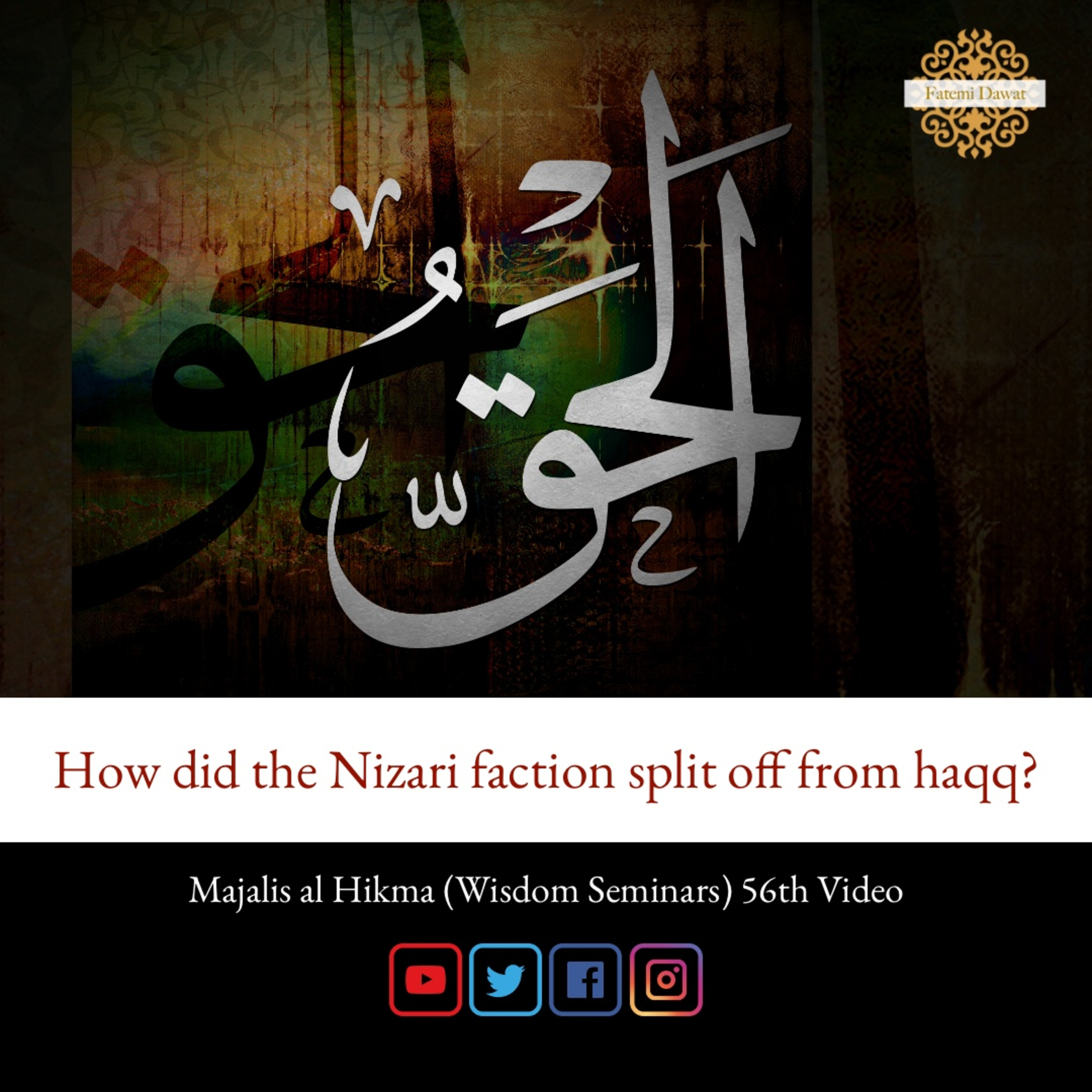
Majalis al Hikma - Syedna Taher Fakhruddin TUSHow did the Nizari faction split off from haqq? (English) - Majalis al HikmaIn the previous Majalis, Syedna Fakhruddin TUS explained the cause of the Sunni Shi’a split (Majlis 47-49) and the split of the Zaydis in time of the fourth Imam, Mohammed al-Baqir SA (Majlis 50). He then addressed the split of the Isna-Ashari (Twelver Shi’a) faction following Imam Ja’far al-Sadiq SA (Majlis 51-52). In this Majlis he discusses the split after the 18th Imam al-Mustansir billah Amirul-Mumineen SA.
Some historians argued that Nizar was the eldest son of Mustansir Imam and so he must be the rightful heir. Others contend that Nizar was given...
2021-07-0919 min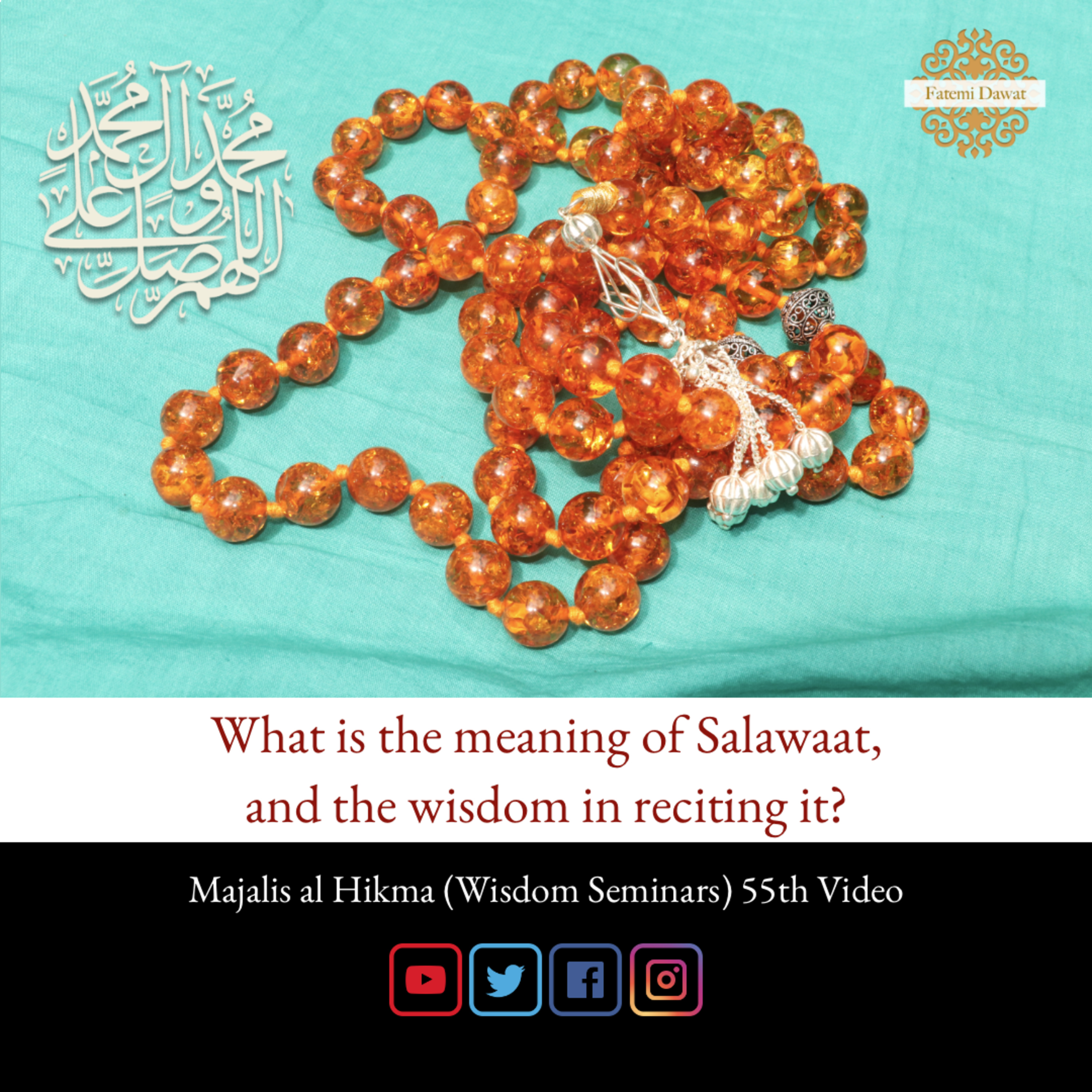
Majalis al Hikma - Syedna Taher Fakhruddin TUSWhat is the meaning of Salawaat? (English) - Majalis al HikmaWhat is the meaning of Salawaat, and the wisdom in reciting it?
Allah Ta’ala commands Muslims in the Quran Majeed, “Allah ta’ala and his angels pray salawaat on the Prophet, O you who believe – Mumineen – pray salawaat on him and greetings.”
When this ayat was revealed, the Muslims asked Rasulullah SA how to invoke salawaat. Rasulullah replied and instructed to pray salawaat in this manner: “Allahumma salli ala Mohammedin wa ‘ala aale Mohammedin wa baarik wa sallim warham wa tarahham kama sallayta wa sallamta wa baarakta wa rahimta wa tarah...
2021-07-0222 min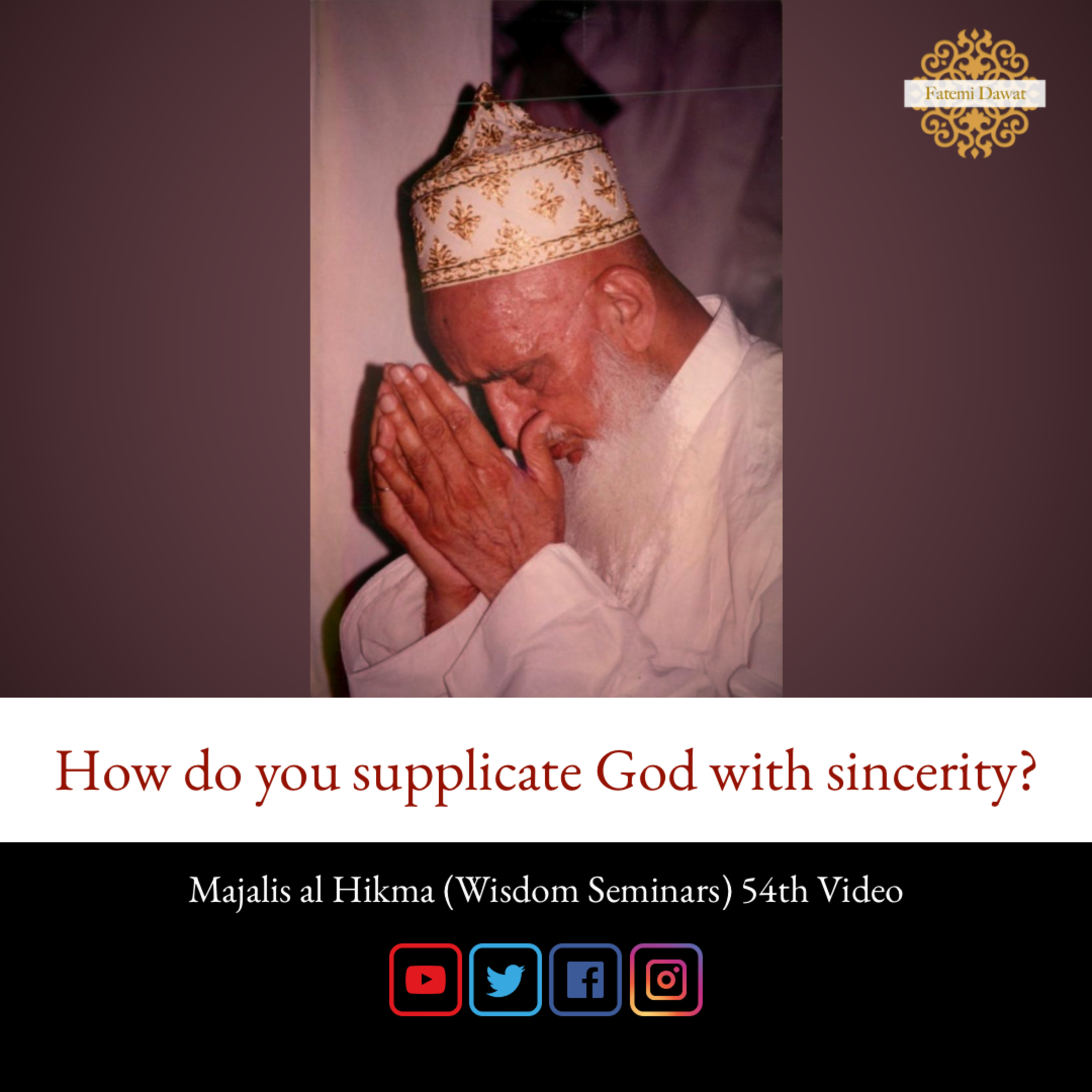
Majalis al Hikma - Syedna Taher Fakhruddin TUSHow do you supplicate God with sincerity? (English) - Majalis al HikmaHow can a Mumin pray with full sincerity and conviction? What is the wisdom in sincere supplication? What belief should you hold when you pray so that you obtain abundant blessings?
Our Hudaat Kiraam guide us to pray with sincerity, in sajda, to beseech Allah with the wasila and intercession of our Awliya’, to seek our Mawali Tahireen’s doa, to recite the doa-s that they have left for us. What is the wisdom in this?
Allah Ta’ala commands his worshippers in the Quran “pray to me and I will answer you...
2021-06-2520 min
Majalis al Hikma - Syedna Taher Fakhruddin TUSHow do you always live with courage? (English) - Majalis al HikmaHow can a Mumin live his life with courage? How can he remain positive? How can he continue to gather provisions for the Hereafter and increasing his blessings?
The world is a place of trials and tribulations. If one is depressed – whether due to financial and work troubles, issues in relationships, or health issues, what is the remedy to face and overcome depression?
What is the tasbih that Rasulullah SA advised to pray so that we may face trials with courage? What is the guidance of Amirul Mumineen SA du...
2021-06-1918 min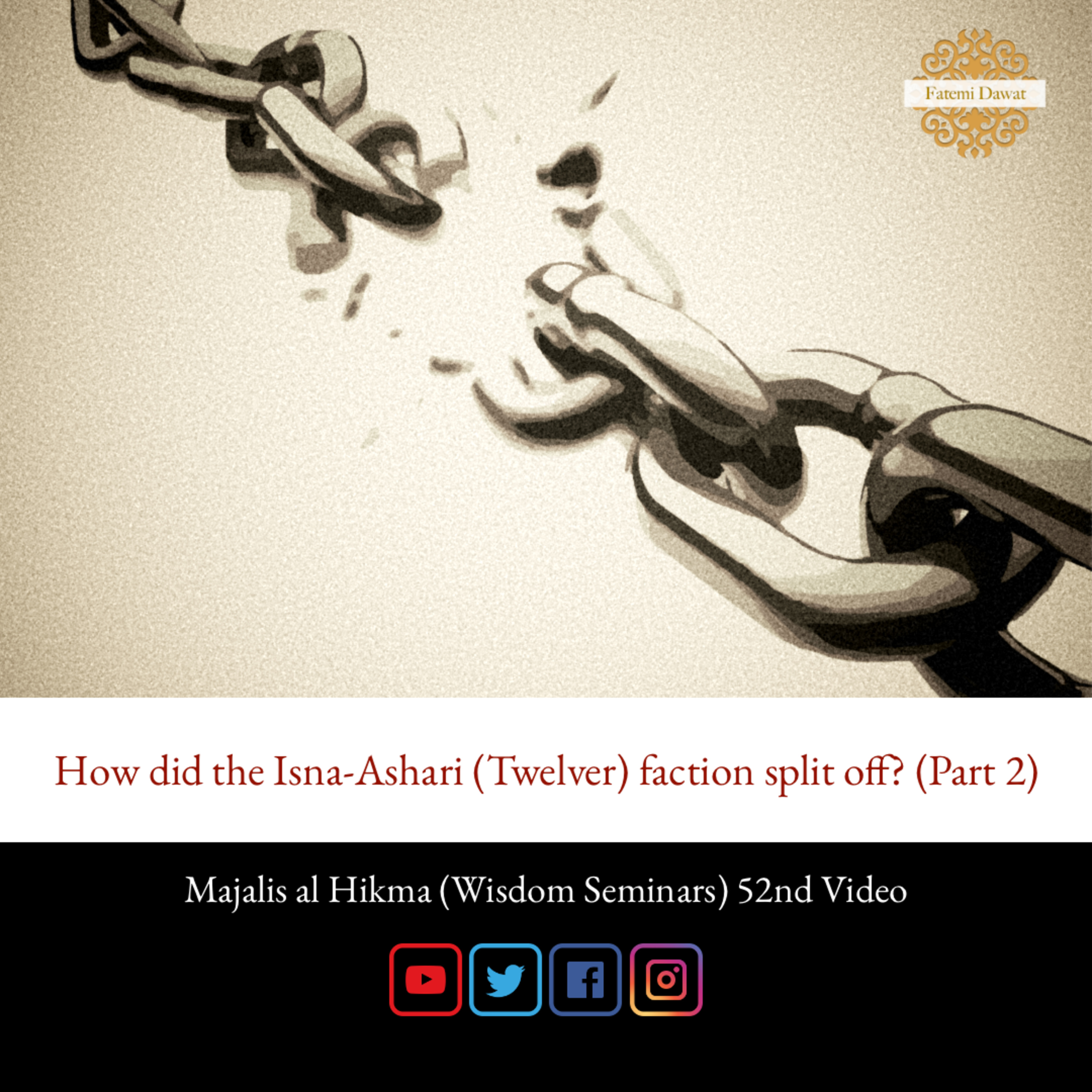
Majalis al Hikma - Syedna Taher Fakhruddin TUSHow did the Isna-Ashari (Twelver) faction split off? (Part 2 - English) - Majalis al HikmaIn the previous Majalis, Syedna Fakhruddin TUS explained the cause of the Sunni Shi’a split and the split of the Zaydis in time of the fourth Imam, Mohammed al-Baqir SA. He then addressed the split of the Isna-Ashari (Twelver Shi’a) faction following Imam Ja’far al-Sadiq SA in Majlis 51. In this Majlis he continues his exposition on the Twelver split.
The Twelvers believe that after Ja’far al-Sadiq Imam SA had done Nass on Isma’il, he changed it and did Nass on Isma’il’s brother Musa Kazim. What are the arguments of o...
2021-06-1216 min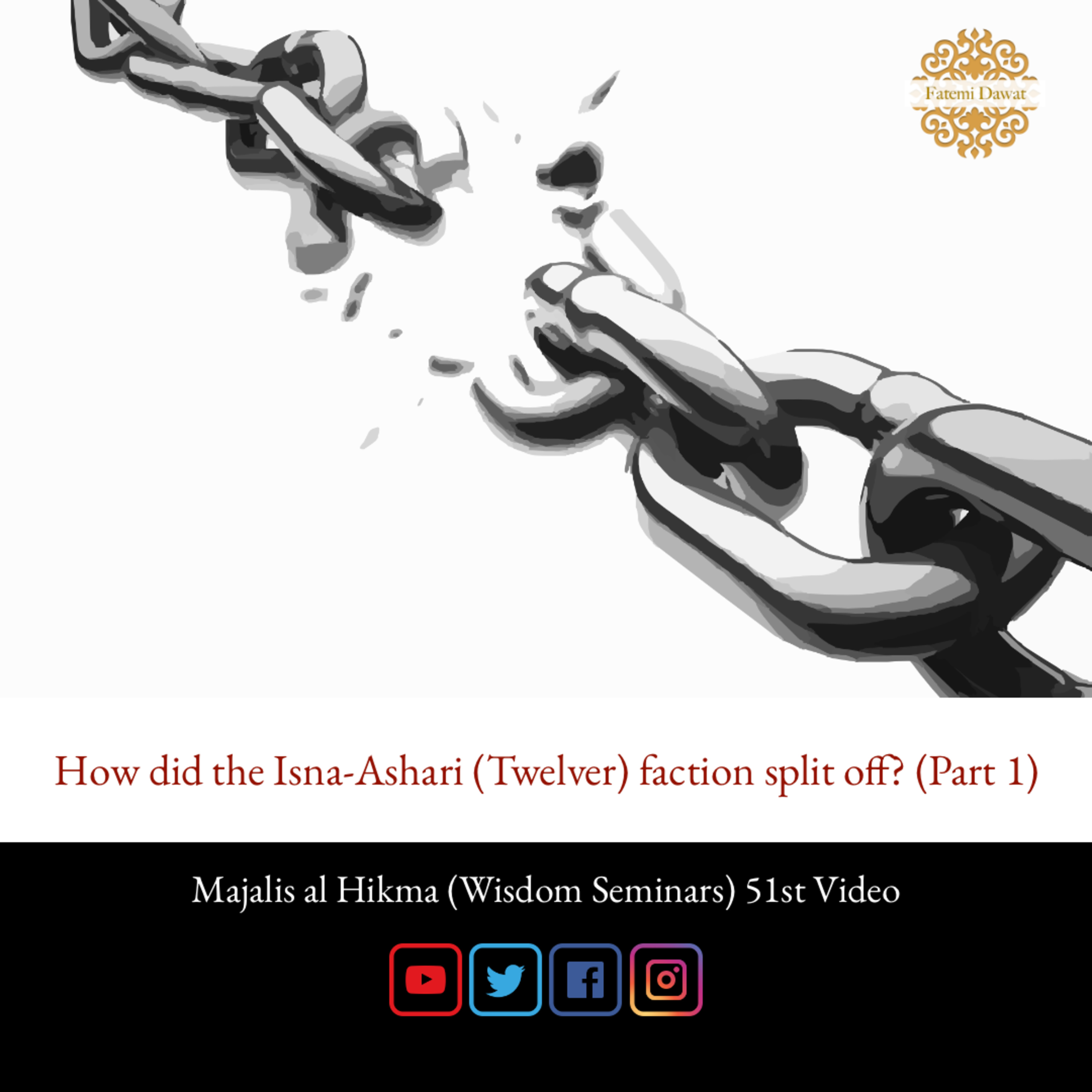
Majalis al Hikma - Syedna Taher Fakhruddin TUSHow did the Isna-Ashari (Twelver) faction split off? (Part 1 - English) - Majalis al HikmaIn the previous Majalis, Syedna Fakhruddin TUS explained the cause of the Sunni Shi’a split and the split of the Zaydis in time of the fourth Imam, Mohammed al-Baqir SA. He now addresses the split of the Isna-Ashari (Twelver Shi’a) faction following Imam Ja’far al-Sadiq SA.
Why did the Twelver Shi’a forsake Imam Isma’il and his son Imam Mohammed bin Isma’il? Why did many of them follow Musa Kazim – also a son of Ja’far al-Sadiq Imam SA?
Why did Imam Ja’far al-Sadiq exhibit t...
2021-06-0417 min
Audio Kajian Sunnah🎧 Fadhlu Majalis Ahlil Ilmi wa Dzikr - Ustadz Abdullah al Bughury (20 audio)simak dan download selengkapnya di www.sunnah.me/2020/07/fadhlu-majalis-ahlil-ilmi-wa-dzikr.html
2021-05-2929 min
Audio Kajian Sunnah🎧 Majalis Syahri Ramadhan - Ustadz Abu Ishaq at Thubani (21 audio)simak dan download selengkapnya di https://www.sunnah.me/2020/05/majalis-syahri-ramadhan-ustadz-abu.html
2021-05-2556 min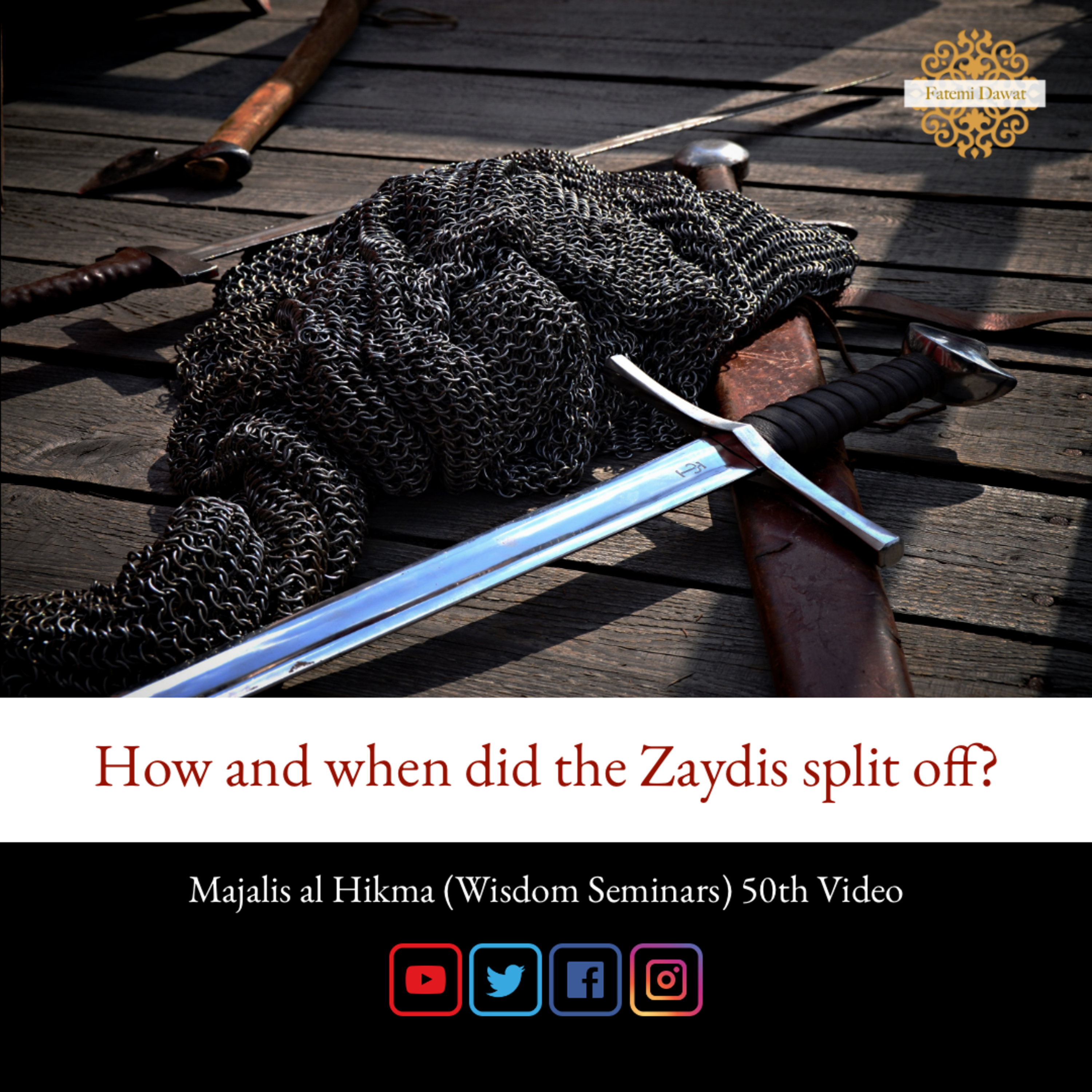
Majalis al Hikma - Syedna Taher Fakhruddin TUSHow and when did the Zaydis split off? (English) - Majalis al HikmaIn the previous three Majalis, Syedna Fakhruddin TUS explained the cause of the Sunni Shi’a split. The next major split occurred in the time of Imam Mohammed al-Baqir SA, the fourth Imam, when the Zaydis split off. They believed in the imamate of Zayd, a son of Imam Ali Zainul Aabedin SA and brother to Imam Mohammed al-Baqir SA.
What was the source of disagreement and discord between Zayd and Imam Mohammed al-Baqir SA? Why did it lead to a split?
The Zaydis believe that an Imam must ha...
2021-05-2115 min
Majalis al Hikma - Syedna Taher Fakhruddin TUSWhat caused the Shia-Sunni split? (Part 3 - English) - Majalis al HikmaIn Part 3 of “What caused the Shia-Sunni split?” Syedna TUS explains Amirul Mumineen’s SA actions and forbearance when his enemies usurped the rightful succession after Rasulullah’s SA _wafaat_. His actions and _sabr_ are proofs of Haqq.
What was the wisdom in Ali’s forbearance? What proofs did Maulatuna Fatema AS assert to establish Ali’s right in face of tyranny? What did Ali do when he was brought in Abu Bakr’s presence for the _bay’at_? In such difficult circumstances, how did Ali establish the Dawat of Haqq?
What happe...
2021-04-2219 min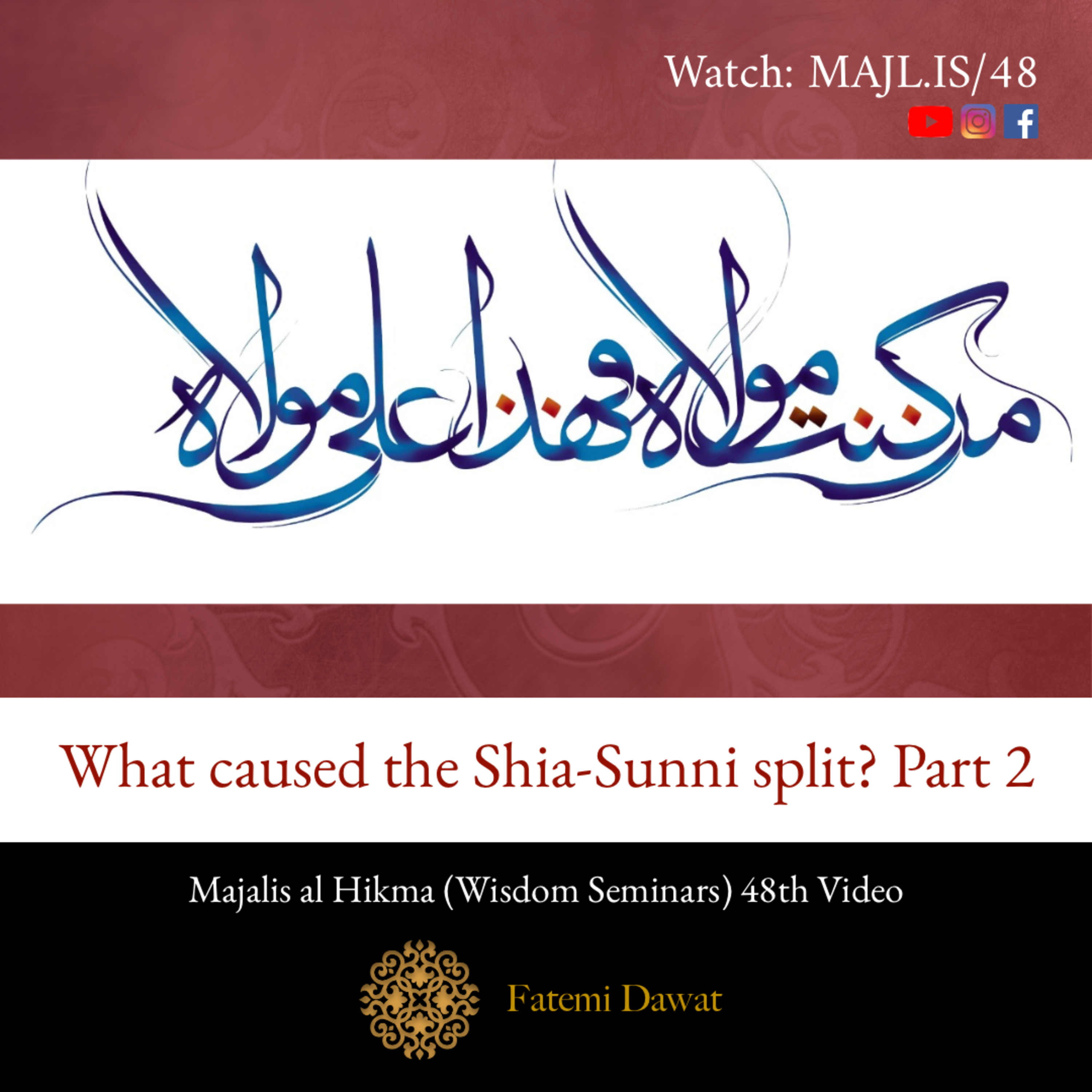
Majalis al Hikma - Syedna Taher Fakhruddin TUSWhat caused the Shia-Sunni split? (Part 2 - English) - Majalis al HikmaIn Part 2 of “What caused the Shia-Sunni split?” Syedna TUS continues to describe the events after Rasullulah’s SA wafaat. In this Majlis, Syedna explains Rasulullah’s SA khutba and wise words when he appointed Amirul Mumineen SA in Ghadir-e-Khumm.
How was Ali’s right to succession usurped in the Saqifa gathering after Rasulullah’s SA passing?
Why did Amirul Mumineen sheath his sword after the events of the Saqifa?
What are the arguments of Syedna Hamiduddin al-Kirmani RA against those who usurped Ali’s SA right to...
2021-04-1720 min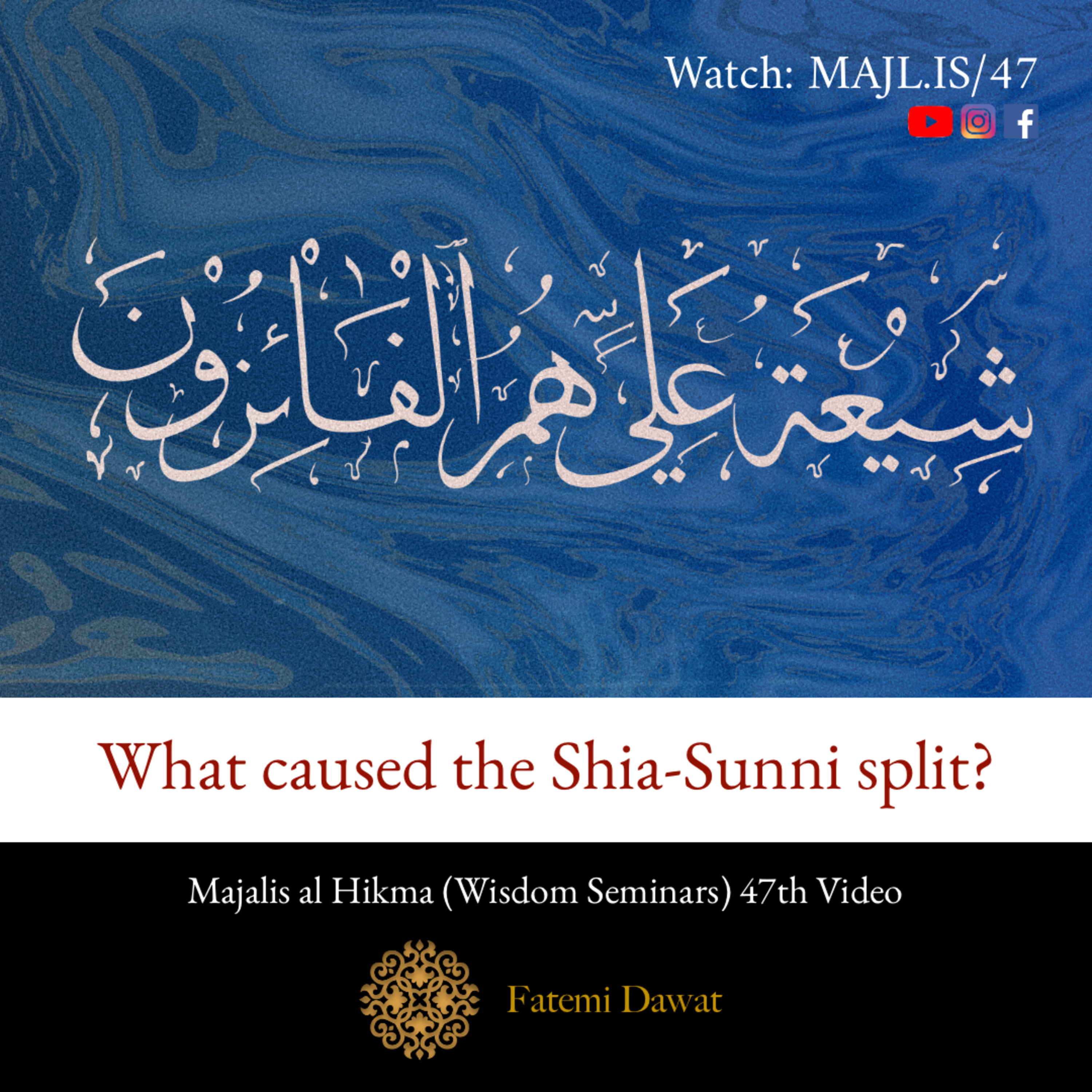
Majalis al Hikma - Syedna Taher Fakhruddin TUSWhat caused the Shia-Sunni split? (English) - Majalis al HikmaAllah Ta’ala commands Rasulullah SA in the Quran “proclaim and convey His message. If you do not convey it, you have not conveyed His message at all.” Syedna al-Mu’ayyad al-Shirazi RA argues that Rasullulah conveyed messages like prayer and zakaat immediately. What was this supremely difficult message that Allah warns Rasullulah that if you do not convey it, you will not have conveyed anything? Why did Rasulullah find it hard to convey?
The first split that happened in Islam was after Rasulullah SA demise when the rightful succession of Maulana Ali bin Abi Tali...
2021-04-0814 min
Majalis al Hikma - Syedna Taher Fakhruddin TUSHow did factions break off in religion, and why? (Part 2 - English) - Majalis al HikmaWhy are there so many religions? Why are there so many differences in beliefs? Even within each religion, why are there so many sects and divisions? And why is it important to know about them?
How does one recognize Haqq and truth?
Syedna TUS continues to answer these questions in this Majlis, the 45th in the Majalis al Hikma series.
Watch short video in Dawat ni Zabaan:
https://youtu.be/bUUNOFx3x4M
Watch short video in...
2021-03-1916 min
Majalis al Hikma - Syedna Taher Fakhruddin TUSHow did factions break off in religion, and why? (Part 1 - English) - Majalis al HikmaWhy are there so many religions? Why are there so many differences in beliefs? Even within each religion, why are there so many sects and divisions? And why is it important to know about them?
How does one recognize Haqq and truth?
Syedna TUS answers these questions in this Majlis, the 44th in the Majalis al Hikma series.
Watch short video in Dawat ni Zabaan:
https://youtu.be/EeOlC2C-9KQ
Watch short video in English:
2021-03-0518 min
Majalis al Hikma - Syedna Taher Fakhruddin TUSHow can you live a stress-free life? (English) - Majalis al HikmaDo you know a single person in this world who is free from hardship - whether he is rich or poor? This world is an abode of difficulties and calamities. We face a continuous stream of trials, troubles and tragedies.
In this kind of an environment, how can you live stress-free without being overwhelmed by anxiety? How do you achieve peace and contentment?
What do our Mawali Tahereen advise? What is the sage advice of Amirul Mumineen Maulana Ali SA in the face of trials and tribulations?
2021-02-2613 min
Majalis al Hikma - Syedna Taher Fakhruddin TUSWhat is the distinction of the month of Rajab? (English) - Majalis al HikmaAllah Ta’ala says in the Quran Majeed “He is Allah – there is no God but He, the Eternal Sustainer”.
Our Awliya’ Kiraam say the days of Rajab are part of “the days of Allah.” These are the auspicious days referred to in the Quran Majeed, when Allah Ta’ala says to Musa AS, “Remind them of the days of Allah.”
A day is defined by the rising and setting of the sun - so what makes some days special?
Why is the month of Rajab so honoured...
2021-02-1218 min
Majalis al Hikma - Syedna Taher Fakhruddin TUSWhat is the true way to declare God’s oneness, tawhid? (English) - Majalis al HikmaAllah Ta’ala says in the Quran Majeed “He is Allah – there is no God but He, the Eternal Sustainer”.
There are many faiths and, within Islam, many denominations. Each faith and each denomination within Islam perceive God in different ways. What is the true belief regarding Allah’s Oneness – _Tawhid_? What have our Hudaat Kiraam – especially Amirul Mumineen SA in his _khutbahs_ – taught us about _Tawhid_?
Allah Ta’ala says in the Quran that He does not forgive those who assign Him partners - that is those who commit _shirk_. Sy...
2021-01-2920 min
Majalis al Hikma - Syedna Taher Fakhruddin TUSWhat is the evidence against atheism? (English) - Majalis al HikmaAtheists accuse people of religion of being gullible and say that religion is a suspension of critical thinking - they say religious people have “blind faith.” Atheists argue that if God existed we would see Him. What is the basis of belief? They also argue that if you say that the creation is proof of a Creator, then who created the Creator? Isn’t this an infinite regression?
How should a Mumin recognize and understand God? How should a Mumin safeguard himself from atheistic belief?
Syedna TUS answers these questions and res...
2021-01-2220 min
Majalis al Hikma - Syedna Taher Fakhruddin TUSWhat is the origin of evil? (English) - Majalis al HikmaAllah Ta’ala says in the Quran “whoever does an atom’s worth of good – khayr, he shall see it. Whoever does an atom’s worth of evil – sharr, he shall see it.”
Allah Ta’ala is the “Creator of all things” – but would never create evil, so who did? How did evil come into existence?
Amirul Mumineen Maulana Ali SA has said that there are three root causes of all evil. What are they?
The Quran Majeed has described “the best – khayr – of creation” and “the worst – s...
2021-01-0816 min
Majalis al Hikma - Syedna Taher Fakhruddin TUSWhat is the benefit in cultivating good habits? (English) - Majalis al HikmaHow do you form good habits? How do you guard yourself against bad habits that are harmful?
Allah Ta’ala says in the Quran Majeed, “Those who are among the pious believe in Allah and the last Day of Judgment, they command good and forbid evil, and they hasten to do good works.”
It is often difficult to take out time for good deeds when more base passions constantly pull the human soul towards selfish worldly pleasures. The Ikhwan-us-Safa state that “habit is the fifth nature,” but how do you cultiv...
2021-01-0115 min
Majalis al Hikma - Syedna Taher Fakhruddin TUSWhat is the wisdom in offering Najwa? (English) - Majalis al HikmaAllah Ta’ala states in the Quran Majeed, “O believers when you come to speak with God’s messenger, offer him ahead of your conversation najwa...”
What is the meaning of the word “najwa”?
What did Amirul Mumineen SA do when this ayat was revealed?
It is the practice of Mumineen to offer najwa – that we also call salaam – to the Imam and Dai in every age, meaning they offer an amount of monetary value as a gift. Why do they do so? What is the importanc...
2020-12-1816 min
Majalis al Hikma - Syedna Taher Fakhruddin TUSWhy should you keep a beard? (English) - Majalis al HikmaIn Islam, why does Shari’at say men should keep a beard? What is the benefit and meaning of this rule?
Is this a sunnat – a tradition of Rasulullah SA?
What does the beard symbolize in the context of Tawil?
Syedna TUS answers these questions in this Majlis, the 36th in the Majalis al Hikma series.
Watch short video in Dawat ni Zabaan:
https://youtu.be/F8XmN5DupHk
Watch short video in E...
2020-11-2613 min
Majalis al Hikma - Syedna Taher Fakhruddin TUSWhat is the reality of Paradise? (English) - Majalis al HikmaIn the previous Majlis Syedna Taher Fakhruddin TUS answered this question: Where is paradise? In this 35th Majlis, Syedna TUS continues his explanation on Paradise.
Rasulullah SA has said that whoever prays “La illah illa”, the Shahadat, with sincerity has entered Paradise. Rasulullah did not say he will enter – but that he already has. What is the meaning of this statement? And how does one utter the Kalema with sincerity?
How do we reconcile this affirmation of Paradise in this world with Rasulullah’s Hadith, “This world is a prison for t...
2020-11-1316 min
Majalis al Hikma - Syedna Taher Fakhruddin TUSWhere is Paradise? (English) - Majalis al HikmaWe acknowledge in the supplication of our daily prayer that paradise is real – ‘innal-jannata-haqqun’. The Quran attests that “Allah calls towards paradise” – so where is the paradise towards which he calls?
Describing paradise Allah Ta’ala also says in the Quran “hasten towards your Lord’s forgiveness, and towards a paradise as wide as the skies and the earth, which has been prepared for the God fearing.” If paradise is as vast as the skies and the earth, why can’t we see it?
The Quran also describes paradise through symbols and si...
2020-11-0615 min
Majalis al Hikma - Syedna Taher Fakhruddin TUSIn how many days was this world made? (English) - Majalis al HikmaThere are many verses in the Quran Majeed in which Allah Ta’ala mentions the creation of the world. But many Ayats give different numbers of days of creation. In one instance the Quran says six days; in another instance the Quran states that the earth was created in two days, and then the mountains in four days, and then the sky in two days – in total eight days. Our Du’at have argued that a day is from when the sun rises to when the sun sets. If the sun and the earth were not yet created, how do you...
2020-10-3017 min
Majalis al Hikma - Syedna Taher Fakhruddin TUSIs there life on other planets in the universe? (English) - Majalis al HikmaThe universe – with its celestial sphere and stars and planets – is vast and immense. Allah Ta’ala says in the Quran Majeed “the creation of the skies and the Earth is greater than the creation of humans. But most humans do not understand.” The Quran also says, “In the alternating of night and day and in what Allah has created in the skies and the earth, there are signs for the God-fearing”. What are those signs?
Humans have travelled to space. They have already landed spacecraft on Mars. One of the questions they seek to answer is t...
2020-10-2312 min
Majalis al Hikma - Syedna Taher Fakhruddin TUSHow do you achieve contentment? (English) - Majalis al HikmaContentment means being happy with the blessings Allah Ta’ala has bestowed on you. It means not feeling that you have been given less than you deserve. Amirul Mumineen Maulana Ali SA said, “Contentment is a treasure that never runs out.” So, how do you achieve contentment?
But what about ambition? People wish for many things in this world and have many ambitions. How do we reconcile ambition with Amirul Mumineen’s advice about contentment?
Syedna TUS answers these questions in this Majlis, the 31st in the Majalis al Hikma se...
2020-10-1512 min
Majalis al Hikma - Syedna Taher Fakhruddin TUSHow do you earn a living? (English) - Majalis al HikmaAllah Ta’ala says in the Quran Majeed “If from the beginning Allah gave all the humans in the world the wealth they desired – they would practice treachery on each other. Instead He sends down in due measure what He wills.” It is in God’s wisdom that humans expend effort and work hard to earn a living.
So how do you earn a good living?
What should you do when you suffer a setback?
What actions and deeds increase your livelihood?
And what s...
2020-10-0816 min
Majalis al Hikma - Syedna Taher Fakhruddin TUSHow do you trust in God and not worry? (English) - Majalis al HikmaWorries, stress, and anxiety harm our bodies and our souls. There are many trials and tribulations in life that cause worry – how can you protect yourself?
Allah Ta’ala urges people to place their trust in Him in many places in the Quran Majeed, “Whoever places his trust in Allah, Allah will take care of him.” He says further in the Quran, “If you are believers – Mumineen – then place your trust in Allah… Allah loves those who place their trust in Him.”
What is the meaning of “putting trust in Allah?” How have...
2020-10-0114 min
Majalis al Hikma - Syedna Taher Fakhruddin TUSWhat is the wisdom in walking the middle road? (English) - Majalis al HikmaIn Arabic ‘wasat’ means the center of everything - to have balance and harmony. Allah Ta’ala says in the Quran Majeed in praise of the Imams that they are the “middle community” or the “community of the center” – ummatan wasata. What is the meaning of this characterization? What is the wisdom in it?
What is the middle road? And what is the benefit in walking the middle path?
How can a Mumin follow the middle path? How can he lead a balanced life according to the guidance of our Mawali?
...
2020-09-2414 min
Majalis al Hikma - Syedna Taher Fakhruddin TUSWhat is the highest knowledge? And why? (English) - Majalis al HikmaThe Quran Majeed states that “Allah will exalt those who have knowledge to high ranks.”
The highest knowledge is the knowledge of Aal-e-Mohammad. And while all knowledge is knowledge, the knowledge of Aal-e-Mohammed is special. It has a higher status than all other kinds of knowledge. Why is that the case?
The highest knowledge within the knowledge of Aal-e-Mohammed is the knowledge of God: He is our Creator and He is One (‘ilm al-Tawhid). This is the heart of all knowledge. Why?
Syedna TUS answer...
2020-09-1715 min
Majalis al Hikma - Syedna Taher Fakhruddin TUSWhat are ghosts? (English) - Majalis al HikmaMany people deny the existence of ghosts (“Jinn” or “Bhut”). They deny the existence of spirits because they cannot be seen by the physical eye. But the Quran speaks of Jinn in many ayats – which have many deeper meanings. In fact, there is an entire Sura named after them: ‘Surat al-Jinn’.
So what are ghosts and why have they been created?
What are the different kinds of spirits? How do we protect ourselves, our children and our homes from evil spirits?
Syedna TUS answers these question...
2020-09-1014 min
Majalis al Hikma - Syedna Taher Fakhruddin TUSWhy should you be patient in adversity? And how should you practice patience? (English) - Majalis al HikmaNo human is immune from physical pain in this world. No one is immune from emotional pain and stress either. We face difficult experiences, endure hardship and suffering, and at the end of it all – is death.
Allah Ta’ala says in the Quran Majeed, “Those who are patient in adversity will be recompensed beyond all measure.” The Quran also says, “Allah loves those who are patient in adversity.”
One could ask, why are we told to be patient in the face of adversity? Why are we told we will receive...
2020-09-0416 min
Majalis al Hikma - Syedna Taher Fakhruddin TUSWhat is the philosophy of weeping for Husain SA? (English) - Majalis al HikmaRasulullah SA said, “Whoever weeps, or causes someone to weep, or simulates weeping for my son Husain, Paradise is mandated for him.”
Why do we mourn Imam Husain SA? Why has Allah Ta’ala promised Paradise if we weep for his martyrdom in Karbala? What is the philosophy behind it?
Syedna TUS answers these questions in this Majlis, the 24th in the Majalis al Hikma series, a few days before Ashara Mubaraka.
Watch short video in *Dawat ni Zabaan*:
https://youtu.be/6mGlm9k9...
2020-08-1319 min
Majalis al Hikma - Syedna Taher Fakhruddin TUSOn what day was Islam rendered perfect? Why? (English) - Majalis al HikmaIn the Qur’an Majeed, Allah Ta’ala says “Today I have perfected your religion” (Surat al-Ma’ida: 3).
The religion of Islam is great and illustrious, and Allah Ta’ala asserts in the Qur’an that Islam was rendered perfect on this particular day; why did He perfect it on this day? What is the reason?
Surely every Muslim and Mumin must be required to know what is the most important day for the faith of Islam? Can one’s faith be complete without knowing this day and its importance?
...
2020-08-0617 min
Majalis al Hikma - Syedna Taher Fakhruddin TUSWhat is the meaning of Hajj? (English) - Majalis al HikmaThe Hajj pilgrimage is to the Ka’ba – Baytullah – the House of Allah. What is the Ka’ba? Why is it the House of God? Physically it is a structure made of stone. No one claims that Allah Ta’ala resides in it. Then what is the wisdom in heading to Baytullah for Hajj?
Allah Ta’ala states in the Quran Majeed that it is obligatory, for all those who are able, to perform the Hajj pilgrimage. But why is Hajj compulsory?
Syedna TUS answers these questions in this Majlis, the...
2020-07-3017 min
Majalis al Hikma - Syedna Taher Fakhruddin TUSWhat is the meaning of death? (English) - Majalis al HikmaDeath is inevitable and it will come to all. Why did Allah Ta’ala create death? Why are most people afraid of dying? What should a Mumin’s approach be towards it? How should we prepare for it?
Allah Ta’ala states in the Quran Majeed “He created death and life in order to test you to see who among you perform the best of deeds.” The ayat states that Allah Ta’ala created death first and then He created life. What does the creation of death before life mean? Death only comes to the living...
2020-07-2318 min
Majalis al Hikma - Syedna Taher Fakhruddin TUSHow can you attain true happiness? (English) - Majalis al HikmaAmirul Mumineen SA has said “a Mumin is always bright and cheerful” (al-Muminu hash-shun bash-shun).
Most people wish to be happy – and remain happy. But how is that possible when the conditions of this world are so unpredictable: ups and downs, diseases, pain and quarrels. So many different kinds of worries. All this is very real. We face these challenges day and night in this world. In these circumstances, how can a Mumin be happy? How can he strive to always be happy? What is the path to happiness and the deep philosophy behind it?
2020-07-1716 min
Majalis al Hikma - Syedna Taher Fakhruddin TUSWhy is virtue compulsory? (English) - Majalis al HikmaIn the Qur’an Majeed, Allah Ta’ala chooses to describe Rasulullah SA as one who possesses “high moral character – the best.” Why is good character necessary? How is it connected to faith? Is love of Allah Ta’ala and His Awliya’ Kiraam SA not sufficient for salvation and paradise?
What virtues should a Mumin espouse? What characteristics should a Mumin stay away from?
Syedna TUS answers these questions in this Majlis, the 19th in the Majalis al Hikma series.
Watch short video in Dawat ni Zabaan:
2020-07-0918 min
Majalis al Hikma - Syedna Taher Fakhruddin TUSWhat is the best deed? And how can we become better in every way? (English) - Majalis al HikmaAll humans want to be good at what they do. How can we achieve excellence? From where does our desire come to be better? What is the wisdom in becoming the best you can be?
Allah Ta’ala states in the Qur’an Majeed, ‘Allah created whatever He created in the best possible state. And He began the creations of humans from clay.’ What is the meaning of this ayat?
Syedna TUS answers these questions in this Majlis, the 18th in the Majalis al Hikma series.
Wat...
2020-07-0217 min
Majalis al Hikma - Syedna Taher Fakhruddin TUSWhy do we worship Allah? (English) - Majalis al HikmaAllah Ta’ala says in the Quran “I have created jinn and humans only so that they may worship Me” (Surat al-Zariyaat: 56).
The Ayat suggests that the sole reason for creation is that the jinn and humans would worship Allah. This implies that Allah is in need of their worship, and far be it for Allah Ta’ala to be in need or want of anything. On the face of it, this Ayat presents a contradiction. How can we understand it?
How should we worship Allah Ta’ala? What should our...
2020-06-2518 min
Majalis al Hikma - Syedna Taher Fakhruddin TUSHow can you earn the reward of Jihad every day? (English) - Majalis al HikmaJihad is one of the seven pillars of Islam. It is compulsory. What is the meaning of Jihad? Syedna Taher Fakhruddin TUS answers this question in three parts. The first and second part are explained in the 14th and 15th Majlis of the Majalis al Hikma series.
In the 16th Majlis, which is the third and final part on the meaning of Jihad, Syedna does bayan on the three points:
1) According to Shari’at a woman cannot go and fight in battle. How does she attain the reward of perf...
2020-06-1816 min
Majalis al Hikma - Syedna Taher Fakhruddin TUSWhy and how to do Jihad with Dawat’s enemies? (English) - Majalis al HikmaJihad is one of the seven pillars of Islam. It is compulsory. What is the meaning of Jihad? Syedna Taher Fakhruddin TUS answers this question in three parts. The first part is explained in the 14th Majils in the Majalis al-Hikma series: https://youtu.be/ZSXKDvahPFk
Allah Ta’ala says in the Quran Majeed to Rasulullah SA “O Prophet do Jihad against disbelievers and hypocrites.” In the 15th Majils, Syedna answers what does it mean to fight Dawat’s enemies? How do you perform Jihad?
Watch short video in Dawat ni...
2020-06-1119 min
Majalis al Hikma - Syedna Taher Fakhruddin TUSWhat is Jihad? (English) - Majalis al HikmaJihad is one of the seven pillars of Islam. It is compulsory. The Quran asks, “Did you think you would enter paradise without Allah Ta’ala first seeing who among you performed Jihad, or observing who remained patient in adversity?” (Surat Aali-Imran: 142).
Performing Jihad in one’s life and having patience in adversity – sabr – are linked. Only then will we enter paradise.
But what is Jihad? What is that struggle?
Rasulullah SA fought twenty-eight battles. When Rasulullah returned from one of the major battles to Madina, he...
2020-06-0417 min
Majalis al Hikma - Syedna Taher Fakhruddin TUSWhat is the meaning of Misaaq? (English) - Majalis al HikmaWhat is the meaning of Misaaq, the Pledge of Allegiance? Why is it compulsory to give Misaaq to the Imam and Dai?
Is Misaaq a shackle of bondage and slavery - ‘ghulaami’? Does one have a choice whether to give Misaaq or not?
The Quran Majeed speaks of Misaaq - the pledge of allegiance - in more than 70 verses. What is the meaning of Misaaq? What is the need for Misaaq? Why has Allah Ta’ala made it compulsory to give Misaaq in every age to the Imam and during his conc...
2020-05-2819 min
Majalis al Hikma - Syedna Taher Fakhruddin TUSWhat is the meaning of Eid? What is the wisdom in it? (English) - Majalis al HikmaIt is well known that Eid ul Fitar is a very special day, a day of happiness, of celebration; but why? What is the wisdom in it? Why did Rasulullah SA proclaim the merit of Eid?
But first, when is Eid? When Rasulullah was departing for a battle shortly before Ramadan, the Muslims asked him that they earlier started fasting and broke the fast by following Rasulullah. What would they do now? Rasulullah replied, “fast by looking at him and break your fast by looking at him”. The Arabic can be understood as referring to lo...
2020-05-2117 min
Majalis al Hikma - Syedna Taher Fakhruddin TUSWhy do humans need a divine guide? And who is he? (English) - Majalis al HikmaWhat is the need for a Messenger, a Prophet, an Imam, a Dai? Many philosophers claim there is no need for Prophets and that, using our own God-given intelligence, we can understand higher truths. Why do we need a divine guide in order to obtain salvation?
Syedna answers this question in this 9th Majlis of the Majalis al-Hikma series.
Syedna then asks, If you believe there is indeed a need for a divine guide, who then is that guide? There are many who claim to be divine guides, but...
2020-04-3022 min
Majalis al Hikma - Syedna Taher Fakhruddin TUSWhy are we broadcasting Majalis al Hikma? (English) - Majalis al HikmaA listener posed these questions to Syedna: what is the objective of the ‘Wisdom Seminars’ (Majalis al Hikma)? What is the reason for doing bayaan in this manner at this time and broadcasting it? Why deliver the Majalis al-Hikma in three languages: Lisaan-al-Dawat, Arabic and English?
Syedna answers these questions in the 7th Majlis. He explains why these Wisdom Seminars are the need of the hour in today’s day and age of materialism and disbelief. Syedna asserts that it is his duty as the Imam’s Dai to disseminate the Imam’s knowledge so that it...
2020-04-1621 min
Majalis al Hikma - Syedna Taher Fakhruddin TUSWhat is the philosophy of Dawat ul Haqq? (English) - Majalis al HikmaWhat is the meaning of the word philosophy? What is the philosophy of Dawatul Haqq? Syedna defines “philosophy” in this context as a perspective, a way of thinking. How can you make this philosophy a blueprint for your own life? How can you act upon it?
In the Rasa’il Ikhwanus-Safa, Imam Ahmad al-Mastur AS explains that true philosophy is to emulate God within the limits of human capacity. But if God is beyond comprehension, how do we emulate Him?
A thousand years ago, every Thursday, Syedna al-Mu’ayyad al-Shirazi RA answered the questions of his time i...
2020-04-0220 min
Majalis al Hikma - Syedna Taher Fakhruddin TUSWhat is the origin of the intellect? (English) - Majalis al HikmaWhat is the intellect - aql - and where did it come from? Is faith based on intellect and reason - is it rational? Every intelligent person tries to reason the answers to these important questions.
Allah Ta’ala addresses humans in the Quran as rational beings. He addresses them specifically as people of intelligence in so many instances in the Quran. Rasulullah SA said that the first thing God created was the intellect. The Almighty has not created anything more noble or better than that.
Questions can be asked by email to info@fatemidawat.com...
2020-03-2621 min
Majalis al Hikma - Syedna Taher Fakhruddin TUSWhat is the purpose of life? (English) - Majalis al HikmaWhat is the purpose and meaning of life on earth? All this that we see – the sky, the stars and the seas – why does it exist? Why do humans have an upright form and possess intelligence? Humans use their reason to comprehend, they ask why does life exist? Why have I been created? Whatever humans do they do for a reason. Surely the Almighty created this world for a reason. We see this creation, what is the reason for this creation?
Allah Ta’ala says in the Quran “we have not created the sky and the earth and all...
2020-03-1920 min
Majalis al Hikma - Syedna Taher Fakhruddin TUSDo We Have Free Will? (English) - Majalis al HikmaDo we have free will? Or is everything determined by destiny (naseeb)? If our fate is predetermined then how can we be rewarded or punished for our actions? Both destiny and free will are asserted by the Quran: Which one is it?
A thousand years ago, every Thursday, Syedna al-Mu’ayyad al-Shirazi RA answered the questions of his time in the Majalis al-Hikma (Wisdom Seminars). Syedna will answer the questions of today, in today’s language, on YouTube. Each video will be approximately 15 minutes and published both in Dawat-ni-zaban and English on the Fatemi Dawat Youtube Channel ever...
2020-03-1219 min 2020-02-0100 min
2020-02-0100 min 2020-02-0100 min
2020-02-0100 min 2020-02-0100 min
2020-02-0100 min 2020-02-0100 min
2020-02-0100 min
Progeny PodcastWhat struggles come with organizing Youth Majalis? | Mohammed Al Khazraji #008This week we are joined by Mohammed Al Khazraji, an Optometrist who is part of Shabab Al Sibtayn, a youth organisation who hold annual Majalis which is specifically catered for the youth. Mohammed discusses the challenges faced with such a venture as well as what the future holds for youth Majalis.
2019-10-0329 min